Shows

Infectious HistoriansEpisode 99 - Health and Illness in the Ancient World with Helen RheeHelen Rhee (Westmont College) joins the Infectious Historians to discuss her work on illness, pain and healthcare in early Christianity. The conversation begins with an overview of medicine in Greco-Roman antiquity, and transitions from there to survey health and illness in the Hebrew Bible before moving on to early Christian times. The topics covered include changes over time in the association between the divine and health (or disease), asceticism, pain, and the new idea of Christian health through hospitals in cities.
2022-11-111h 00
Infectious HistoriansEpisode 98 - Anti-Vaccination movements with Paula LarssonPaula Larsson (University of Oxford) comes on the new Infectious Historians episode to talk about her work on anti-vaccination movements. The conversation begins with an overview of vaccines before moving into vaccine hesitancy and anti-vaccination. Paula explores the similarities in anti-vaccination movements and their arguments over the past two centuries, while drawing parallels to famous recent cases such as the MMR vaccine and its false links to autism and the Covid vaccine. Near the end, Paula discusses her public engagement work, which she has pursued through multiple pathways.
2022-10-081h 05
Infectious HistoriansEpisode 97 - Empire and the Development of Medicine with Jim DownsJim Downs (Gettysburg College) joins the Infectious Historians to talk about his recent book. The conversation begins with epidemiology and its origins, focusing on the 18th century military bureaucracy and the production of scientific knowledge in venues associated with slavery, prisons, the colonies and war. Jim follows the people who produced this knowledge - but emphasizes the voices of the marginalized groups who are an inherent part of this story. The last part of the interview is a discussion of Jim’s public-facing work and some of the issues that such work might encounter.
2022-09-081h 16
Infectious HistoriansEpisode 96 - Diseases and Urban Space with Sara CarrSara Carr (Northeastern University) joins the Infectious Historians for a conversation about her work on redesigning urban space in response to a pandemic. The discussion begins with a survey of the major changes in urban landscapes in the US over the past two centuries. Sara presents the epidemics she covers - ranging from cholera to urban blight - and talks about the speed in which changes might be expected to occur. The differential impact of diseases among class and residency status comes up in several contexts, and Sara discusses what changes might happen in urban space as a result...
2022-08-191h 13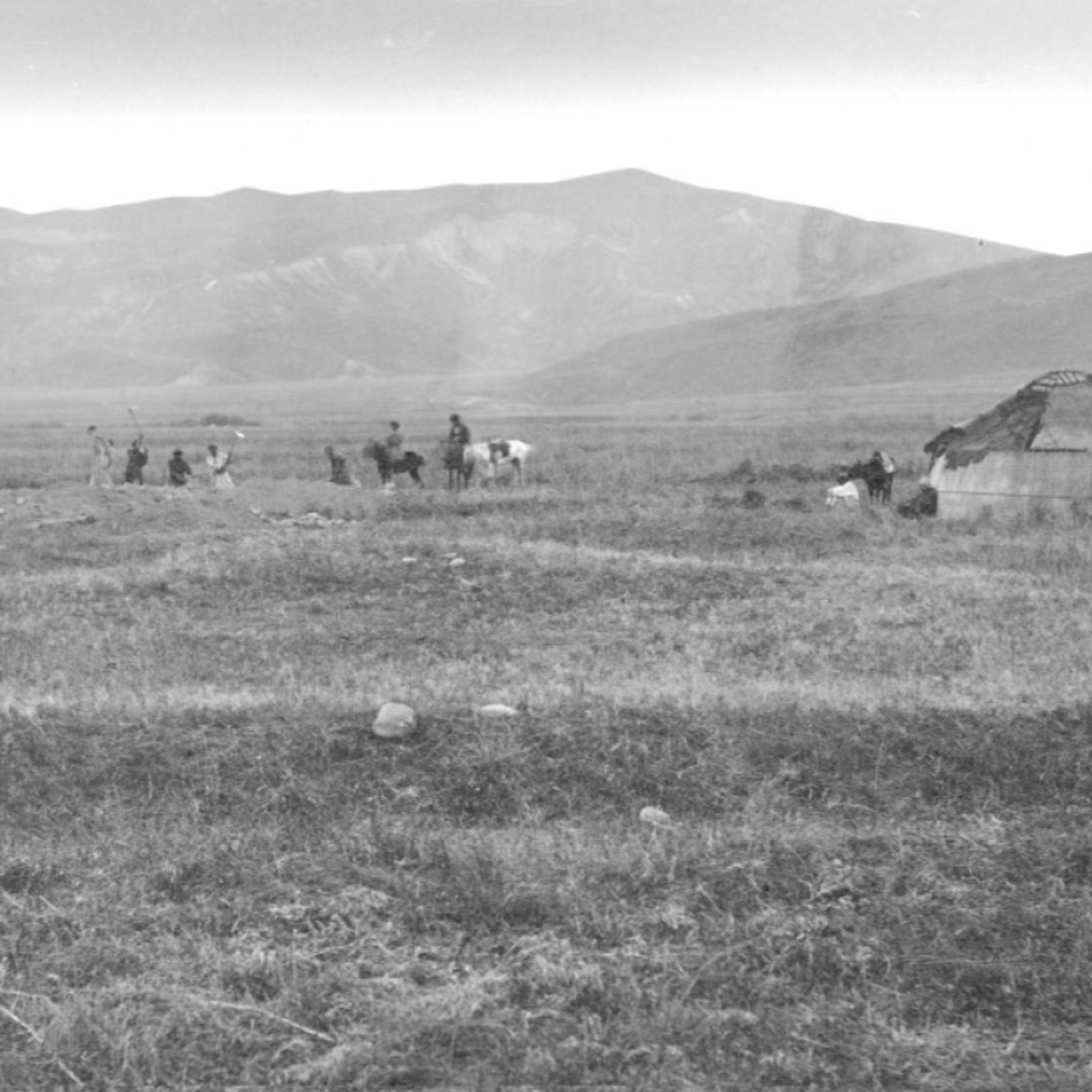
Infectious HistoriansEpisode 95 - New Research on the Source of the Black Death with Maria Spyrou and Phil SlavinMaria Spyrou (University of Tübingen) and Phil Slavin (University of Stirling) join Merle and Lee to discuss their recent Nature publication on the source of the Black Death. After quickly covering the basics of paleogenetics and the history of the Black Death(!), the conversation moves on to the article itself and highlights its importance while also offering a “behind-the-scenes” look at how the research was planned and conducted. In the later part of the episode, Maria and Phil reflect on their collaboration over the past several years as well as on interdisciplinarity, its challenges and its potential.
2022-07-281h 11
Infectious HistoriansEpisode 94 - Epidemic Empire and Colonialism with Anjuli Raza KolbAnjuli Raza Kolb (University of Toronto) joins Merle and Lee to discuss “Epidemic Empire”, her recent book on the history behind the metaphor of the “terrorism epidemic”. The conversation covers the development of the idea of insurgent violence as an epidemic in the nineteenth century, touching on imperialism and colonialism, particularly from a British perspective. Anjuli traces the development of the metaphor chronologically, with several stops along the way, until Covid. Among others, Anjuli examines discourse about Muslims and infectious disease, and several transition points - such as the Haiti Revolution and the Algerian Independence Movement, as well as AIDS and...
2022-07-151h 11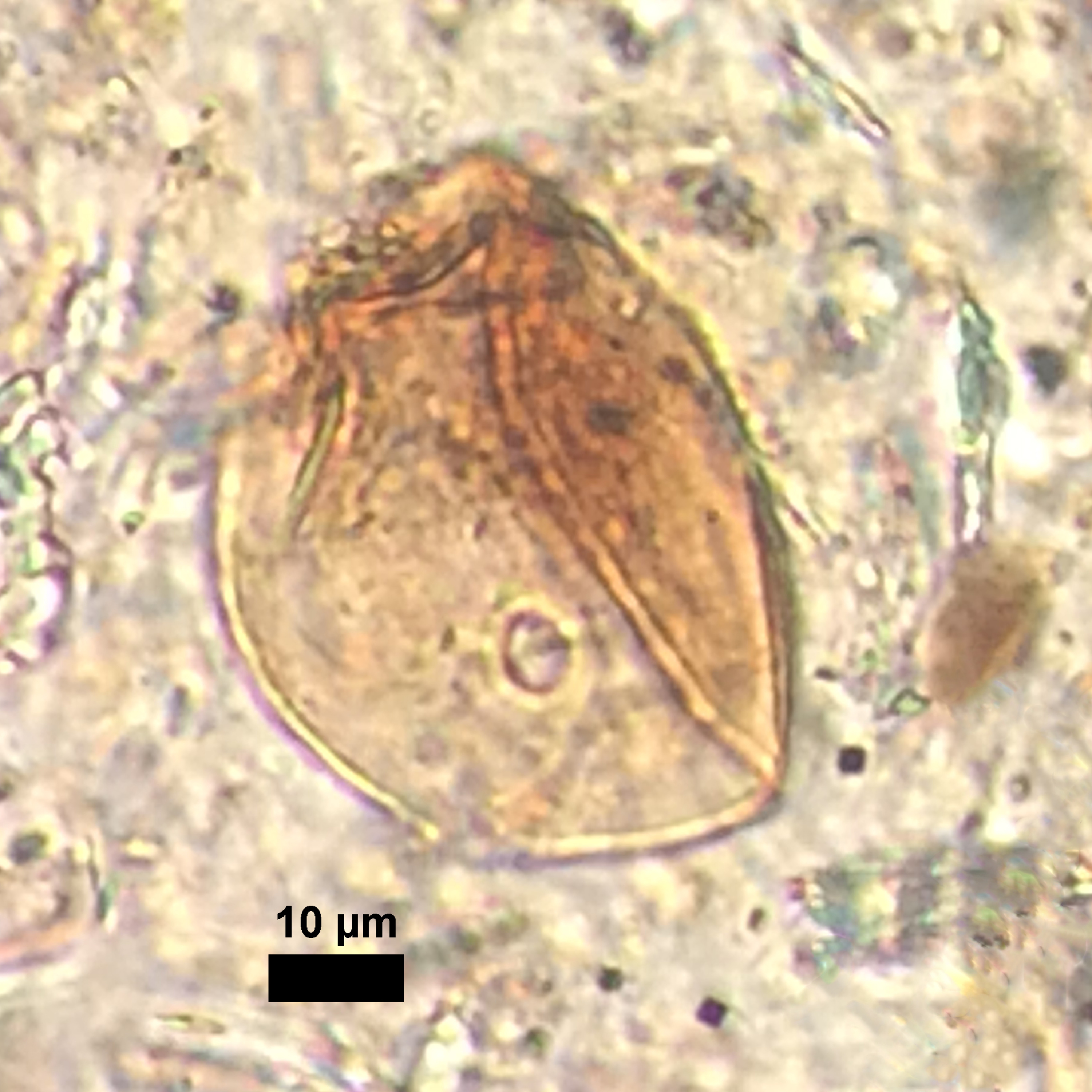
Infectious HistoriansEpisode 93 - Pollen, infectious disease and the Black Death with Adam IzdebskiAdam Izdebski (Max Planck Institute for the Science of Human History) joins the Infectious Historians to discuss his work at the frontier between pollen and disease, and in particular in light of his recent work analyzing pollen from the time of the Black Death. The conversation begins with an introduction to palynology (pollen analysis) and its limitations. Adam discusses fieldwork as well as a few examples for what pollen can offer us before turning to his research and what his large meta-analysis of pollen sites across Europe found about the Black Death. Adam also touches upon the potential of...
2022-07-011h 03
Infectious HistoriansEpisode 92 - Tropical Disease & Medicine with Suman SethSuman Seth [https://sts.cornell.edu/suman-seth] joins Merle and Lee to talk about his work on medicine in the British colonies during the 18th century and how it changed as people learned about tropical diseases. Suman begins by providing background on how medicine was practiced in Britain and in the colonies, alongside how new generations learned about tropical diseases over time. He then discusses how people new to colonies were “seasoned” to acclimate them to tropical diseases along with differences in this impact on colonizers, soldiers, and the enslaved among others. At the end, Suman describes how these chang...
2022-06-101h 03
Infectious HistoriansEpisode 91 - The Mexican Church and Disease in the 16th century with Jennifer HughesJennifer Hughes joins Merle and Lee to discuss her work on empire, society and church in 16th century Mexico. After Jennifer sets up the conversation with some background, the discussion focuses on the growth of the Catholic church in Mexico through the Spanish Empire against a backdrop of periodic epidemic disease, examining changes through both imperial and indigenous perspectives. The discussion covers themes such as the economic impact of disease, conversion to Christianity, and the indigenous response to cataclysmic epidemics. Jennifer also presents the range of attitudes and responses on the Spanish side.
2022-05-311h 05
Infectious HistoriansEpisode 90 - Public Health Labs in History and during Covid with Claas Kirchhelle and Samantha VanderslottClaas Kirchhelle (University College Dublin) and Samantha Vanderslott (Oxford University) talk to Merle and Lee about the development and history of public health laboratories and how they worked (or didn’t) during Covid. After first discussing what a public health lab is and how they work, they speak about when they were created in a few countries around the world and how they have developed historically. Claas and Sam note the role of public and private labs together and the key role of Swine Flu in 2009 in how this shaped public health then and during Covid. They also point ou...
2022-05-121h 22
Infectious HistoriansEpisode 89 - Infectious Historians’ 2nd Anniversary!Merle and Lee meet in person at Princeton University, where they both attended the first in person conference for over two years. The short episode begins with some reflections on Covid and its effects now that things are slowly returning to their pre-Covid state. The conversation continues towards thinking about the podcast’s past year, and Merle and Lee raise several ideas and suggestions they hope to pursue in the podcast’s third year.
2022-04-1532 min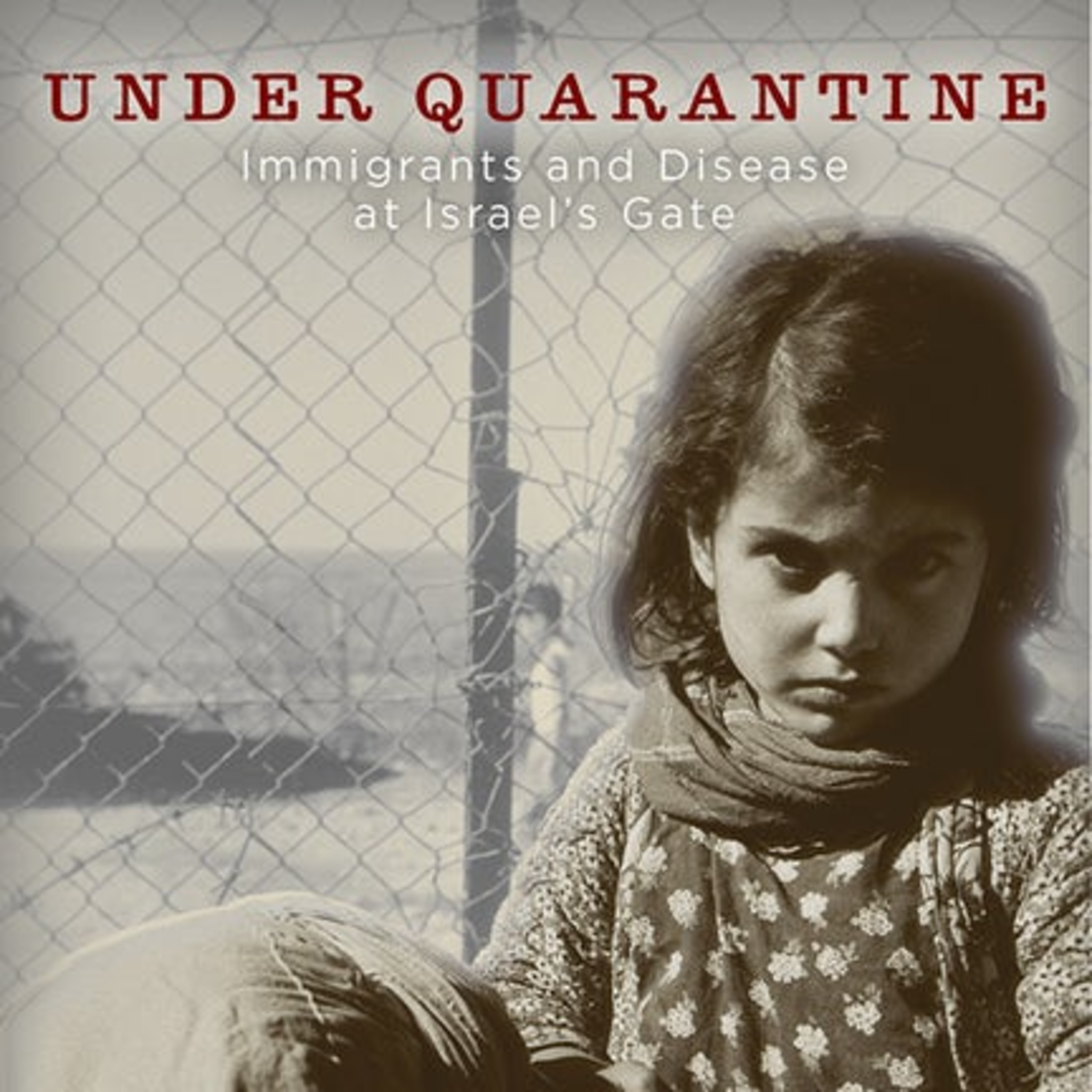
Infectious HistoriansEpisode 88 - Immigrants and Quarantine at Israel’s Founding with Rhona SeidelmanRhona Seidelman (Oklahoma University) talks to Merle and Lee about how the newly founded state of Israel quarantined immigrants at Shaar Ha’aliya. After discussing background information on how large the center was and how many people passed through it, she speaks about the diseases people were treated for while there and the reactions of the people quarantined at the center. Rhona then talks about why the site was no longer used over time, parallels to more familiar sites such as Ellis Island in New York, and why the Israeli public has largely forgotten the site in the decades th...
2022-04-0158 min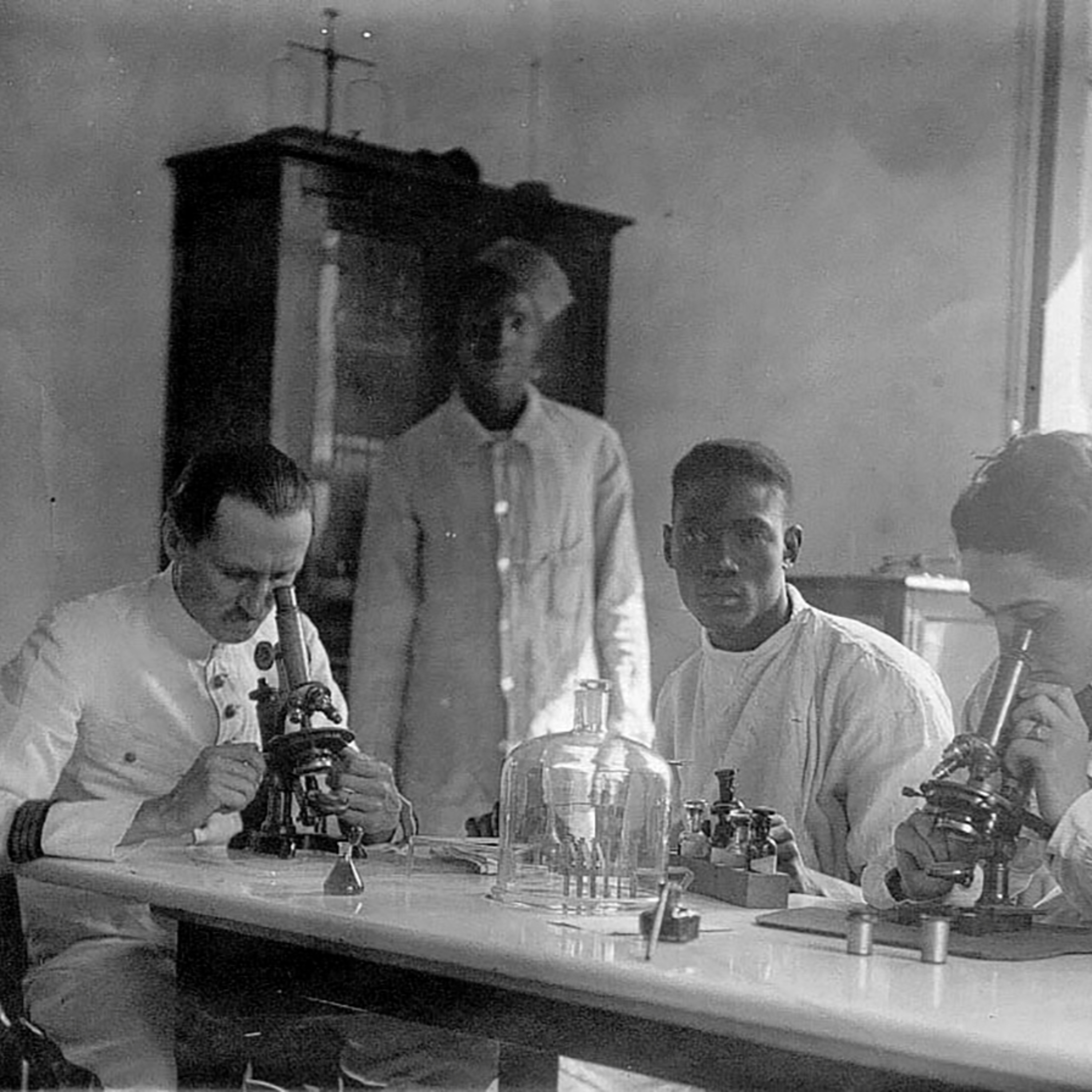
Infectious HistoriansEpisode 87 - Pasteur’s Empire with Aro VelmetAro Velmet (USC Dornsife) joins Merle and Lee to discuss his work on the Institut Pasteur in the context of colonial France in the late 19th century. The conversation begins with some background on colonial France and the French civilizing mission, then moves on to examine the foundation and operation of the Institut Pasteur, especially in the French colonies. Aro explains how the Pasteurians became involved in public health in the French colonies and reflects on their relationship to the French colonial state.
2022-03-141h 05
Infectious HistoriansEpisode 86 - The Antonine Plague with Colin ElliottColin Elliot (Indiana University) talks to Merle and Lee about the late second century CE Antonine Plague and the complicated ways to assess its impact in antiquity. He begins by offering the textbook background to the pandemic before turning to discussing the sources we have for the pandemic along with the problems each type of source has. Colin then turns to discuss how this pandemic exacerbated other existing changes to Roman society at the time and how to try to differentiate its effects. At the end, Colin talks to the hosts about the place of Covid in studying ancient...
2022-02-241h 06
Infectious HistoriansEpisode 85 - Racial Scripts and Pandemics with Keith WailooKeith Wailoo (Princeton University) talks to Merle and Lee about his work on racial scripts and the racialization of pandemics with a focus on Covid. He begins by discussing the idea of pandemics unfolding in dramatic acts and then explains the role of race in this story. Keith examines the deeper history of these racial scripts, along with the impact various disparities play in other pandemics. Finally, he reflects upon the highly differentiated Covid story in the US based on geography and offers a future for the academic study of the history of medicine.
2022-02-111h 10
Infectious HistoriansEpisode 84 - Memories and the Modern Uses of the Black Death with Ben DoddsBen Dodds (Florida State University) speaks with Merle and Lee about his new book on memories, myths, and the modern uses of the Black Death over the past 200 years. He begins by discussing the emotional appeal of why people continue to study the Black Death, along with the increased focus on the pandemic since the outbreak of the Cholera Pandemics in the 19th century. Ben then speaks more specifically about the Black Death’s role as a key part of English exceptionalism, in which the pandemic is key to ideas about freedom and industrialization. At the end, Ben explains th...
2022-01-211h 12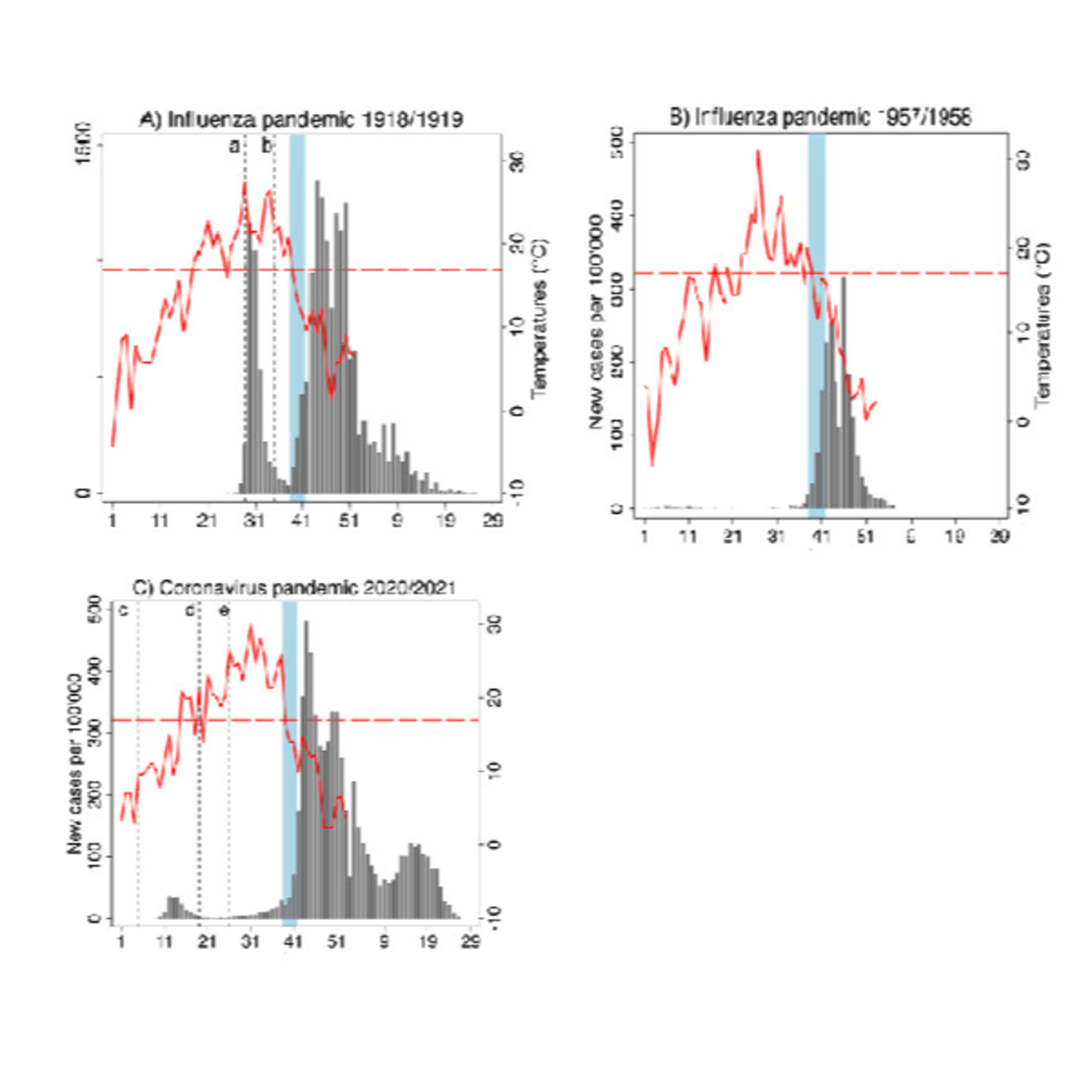
Infectious HistoriansEpisode 83 - Using Historical Epidemiology during Covid with Kaspar StaubKaspar Staub (University of Zurich) talks to Merle and Lee about his work in historical epidemiology and the ways in which it helps contextualize the ongoing Covid pandemic. After first offering background on the field and his education, Kaspar discusses one of his goals, which is to help public health officials and policy makers today understand the historical context of pandemics in the past. He then talks about his work on the 1918 Influenza in Switzerland and its implications for Covid policy, along with how it - and earlier pandemics such as the 1890 “Russian Flu” - fall into the disaster memo...
2022-01-071h 05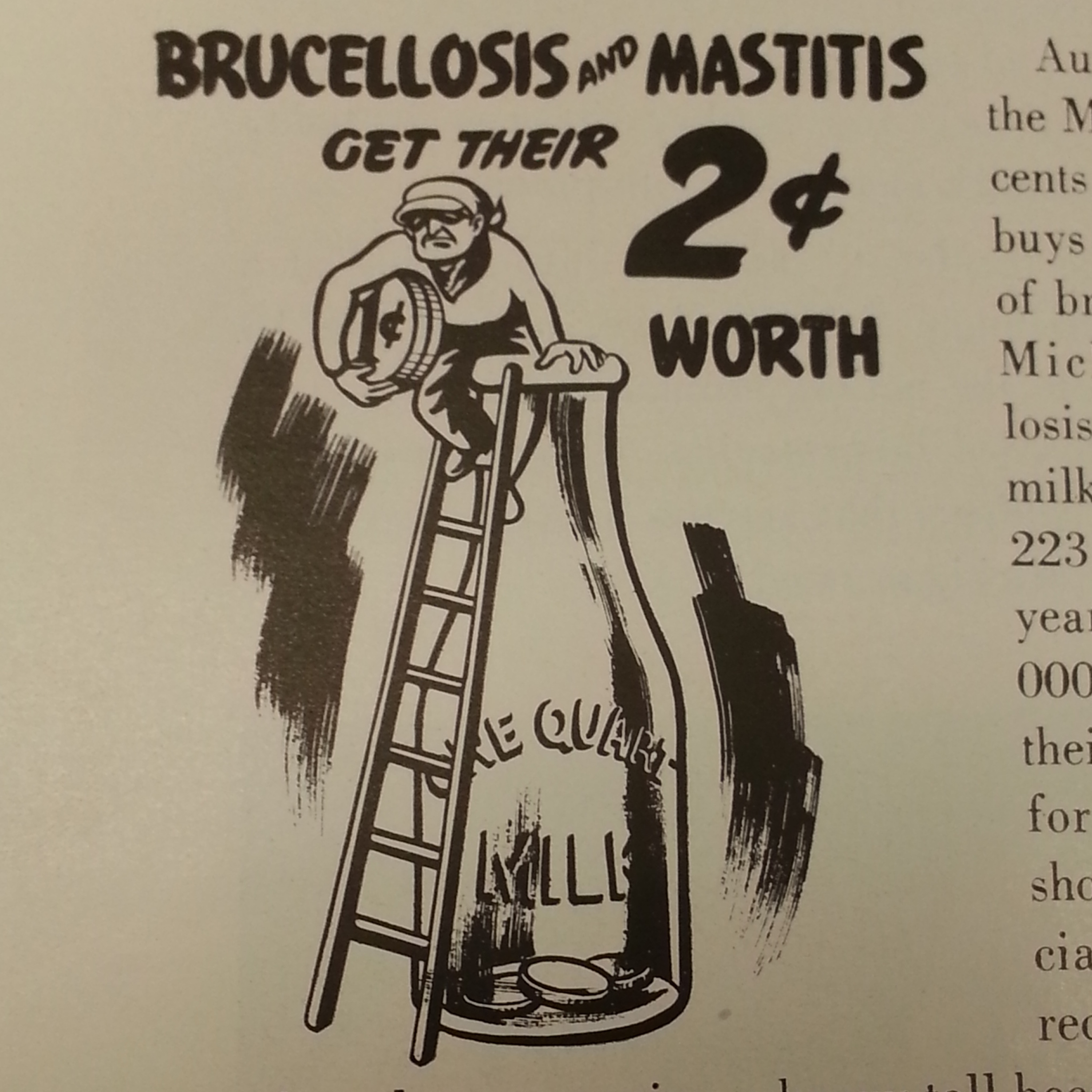
Infectious HistoriansEpisode 82 - Animals and Disease with Rebecca KaplanRebecca Kaplan (Oklahoma State University) joins Merle and Lee to discuss some of her recent work on animals and disease. Rebecca first explains the different reasons why we should care about disease in animals - ranging from moral reasons to economic reasons such as the impact on humans and their livelihoods. Rebecca also touches upon some of the diseases that move between different species of animals. The second half of the interview focuses on brucellosis, a group of diseases that drew attention particularly in the early 20th century in the context of livestock. Rebecca surveys some of the issues...
2021-12-211h 07
Infectious HistoriansEpisode 81 - Archaeology, Pandemics, and Climate Change with Susanne HakenbeckSusanne Hakenbeck (University of Cambridge) joins Merle and Lee to discuss the key role of archaeology in histories of disease, pandemics, and climate change in the ancient and medieval worlds. After discussing the place of archaeology in understanding health and disease, Susanne talks about the pivotal role archaeologists have in contextualizing disease at specific sites, including dating and what human remains can and cannot show. She then speaks about archaeology and climate change, especially the place of resilience in premodern archaeology and how settlement patterns change over time. Finally, she discusses the inherent tensions within archaeology about micro and...
2021-12-0356 min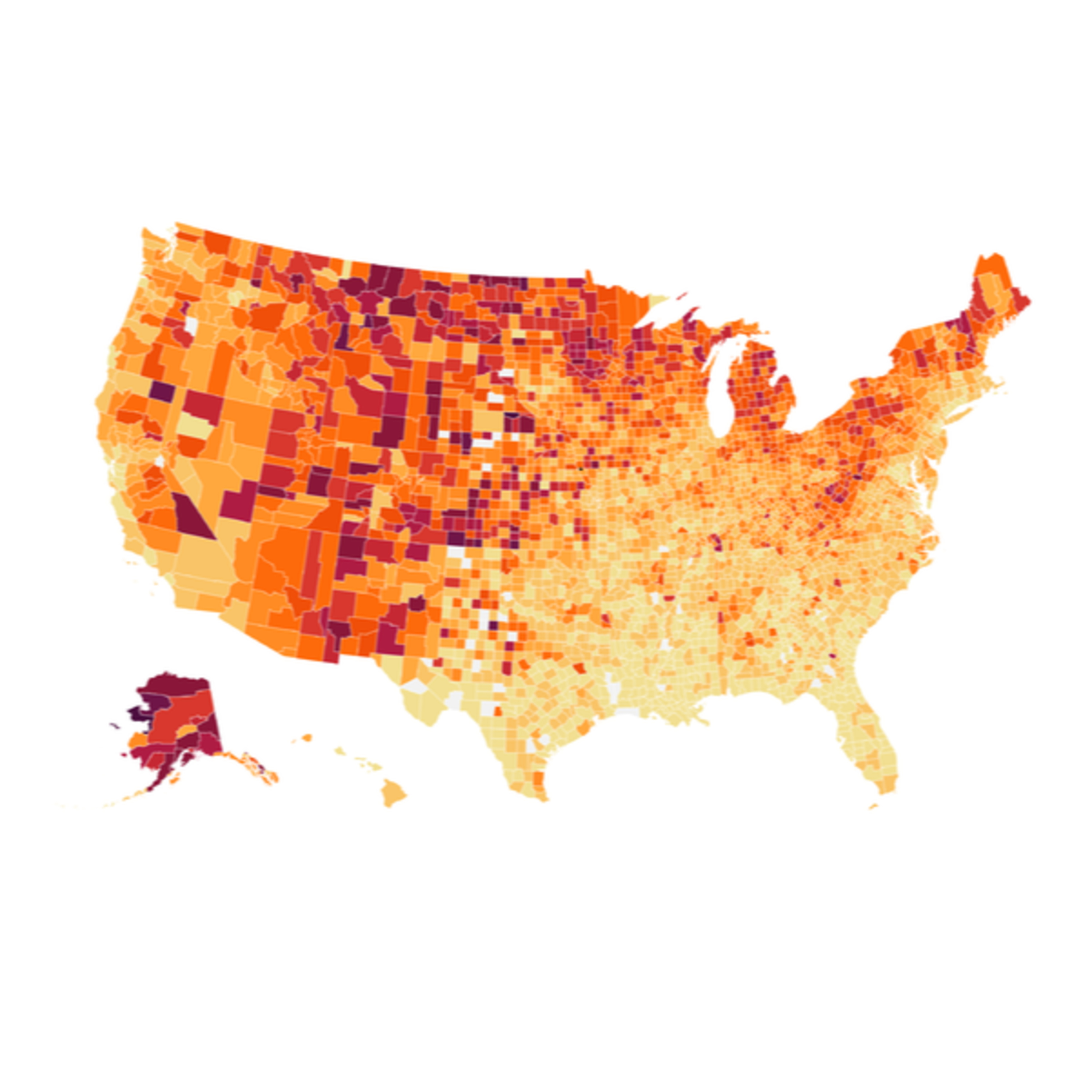
Infectious HistoriansEpisode 80 - Spatial Disease and Covid with Graham MooneyGraham Mooney (Johns Hopkins University) talks to Merle and Lee about the key roles of place and space in how we understand disease in the modern world. After defining these terms and offering a few examples of how to research them, Graham discusses the key role of disease surveillance and tof state coercion in imperial centers and their colonies. He then turns to talk about changes in public health in the last half century, with a focus on the city of Baltimore. At the end, Graham reflects on all of these ideas in light of the Covid pandemic.
2021-11-081h 01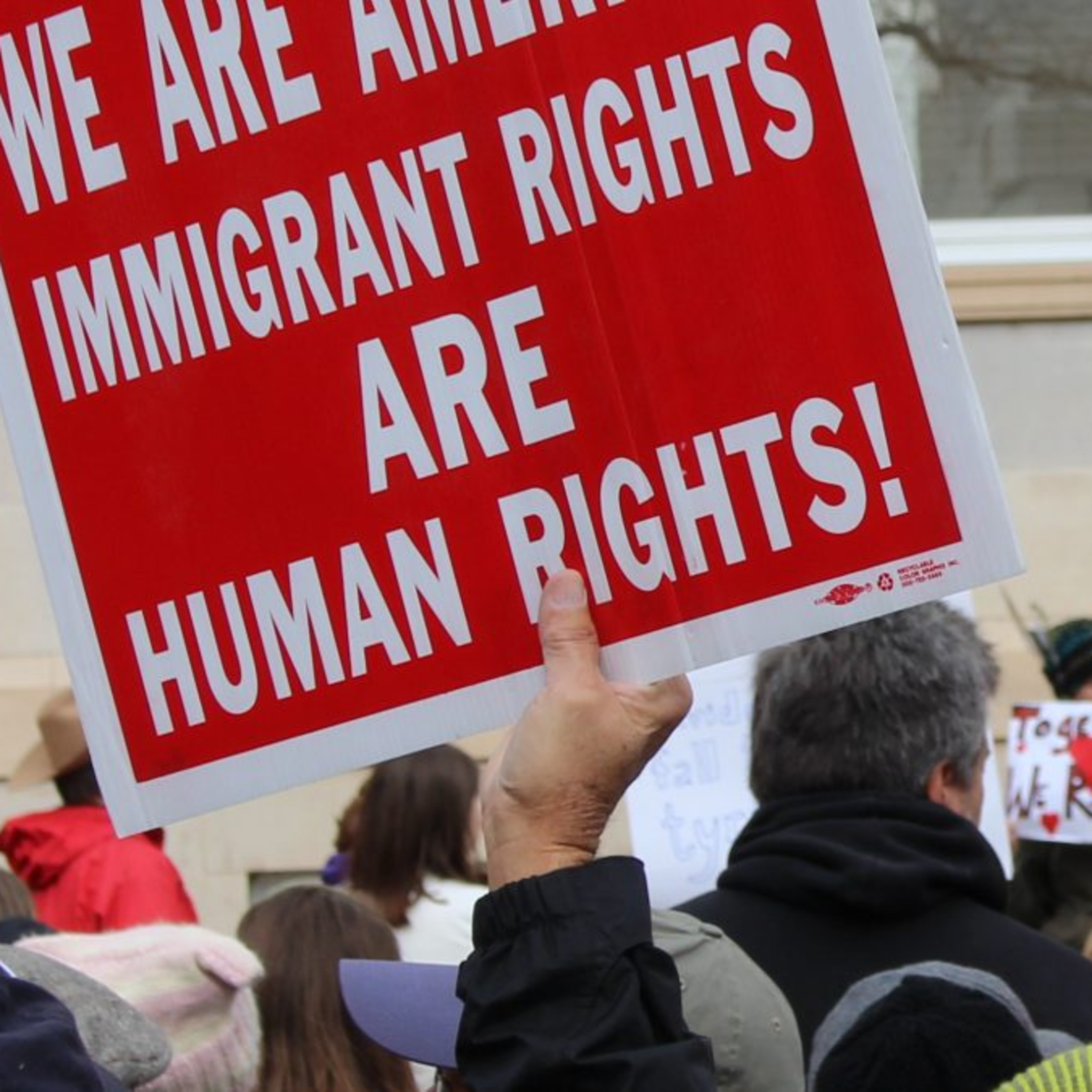
Infectious HistoriansEpisode 79 - Healthcare and Immigrant Healthcare in the United States with Beatrix HoffmanBeatrix Hoffman (Northern Illinois University) joins the Infectious Historians to discuss the healthcare system in the United States. The conversation begins with an overview of the American healthcare system and its origins, then proceeds to cover governmental health programs, highlighting those who receive treatment (and in what form), and those who do not receive treatment and remain uninsured. Beatrix focuses in particular on Cesar Chavez and the United Farm Workers in the 1960s and 1970s, and their attempt to provide heavily subsidized healthcare to union members. The conversation concludes with a reflection on some of Beatrix’s public facing wo...
2021-10-111h 01
Infectious HistoriansEpisode 78 - Covid in Iowa with Emily MendenhallEmily Mendenhall (Georgetown University) joins Merle and Lee to discuss Covid in her hometown in northwest Iowa. The conversation begins with a definition and reflection on the idea of syndemic, then gravitates towards Emily’s own experiences returning to her hometown of Okoboji during Covid. Emily uses the Okoboji case study to disentangle issues within the broader American response to Covid - ranging from the politicization of the question, to the personal and communal interactions and interests, as well as the common values in the community that influenced the overall response of Okoboji to Covid. The interview ends with a...
2021-10-0159 min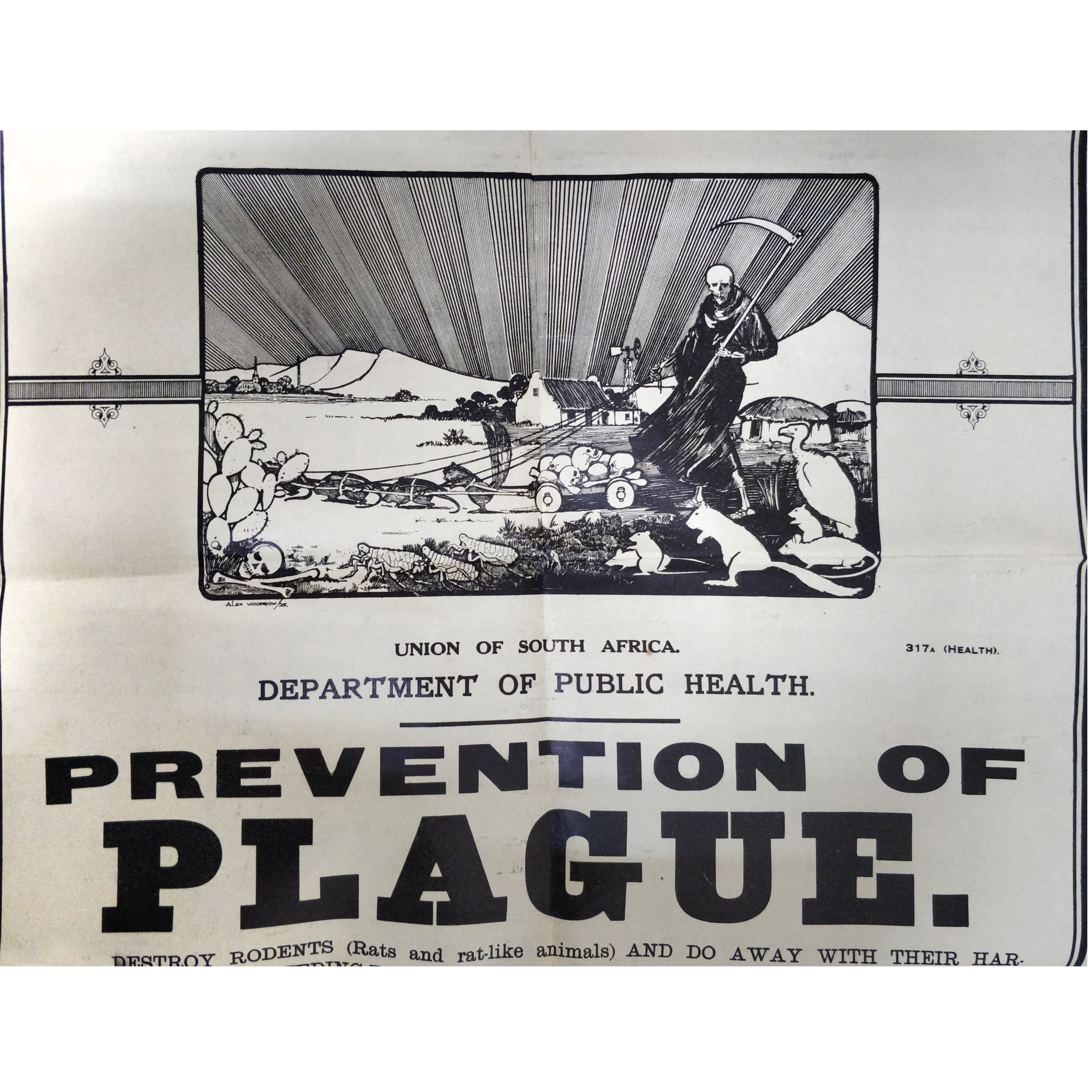
Infectious HistoriansEpisode 77 - Humans, Animals and the Environment in South Africa with Jules Skotnes-BrownJules Skotnes-Brown (University of St. Andrews) joins Merle and Lee to discuss his work on humans, animals and the environment in the context of South Africa at the turn of the 20th century. The interview begins with some background about South Africa and its disease landscape at the time. Jules covers some of the ideas the different contemporary groups had about these diseases and how to prevent or deal with them. The conversation goes over some of these ideas and practices - such as extermination of big game animals or the creation of rat proof belts (cleared strips of...
2021-09-1759 min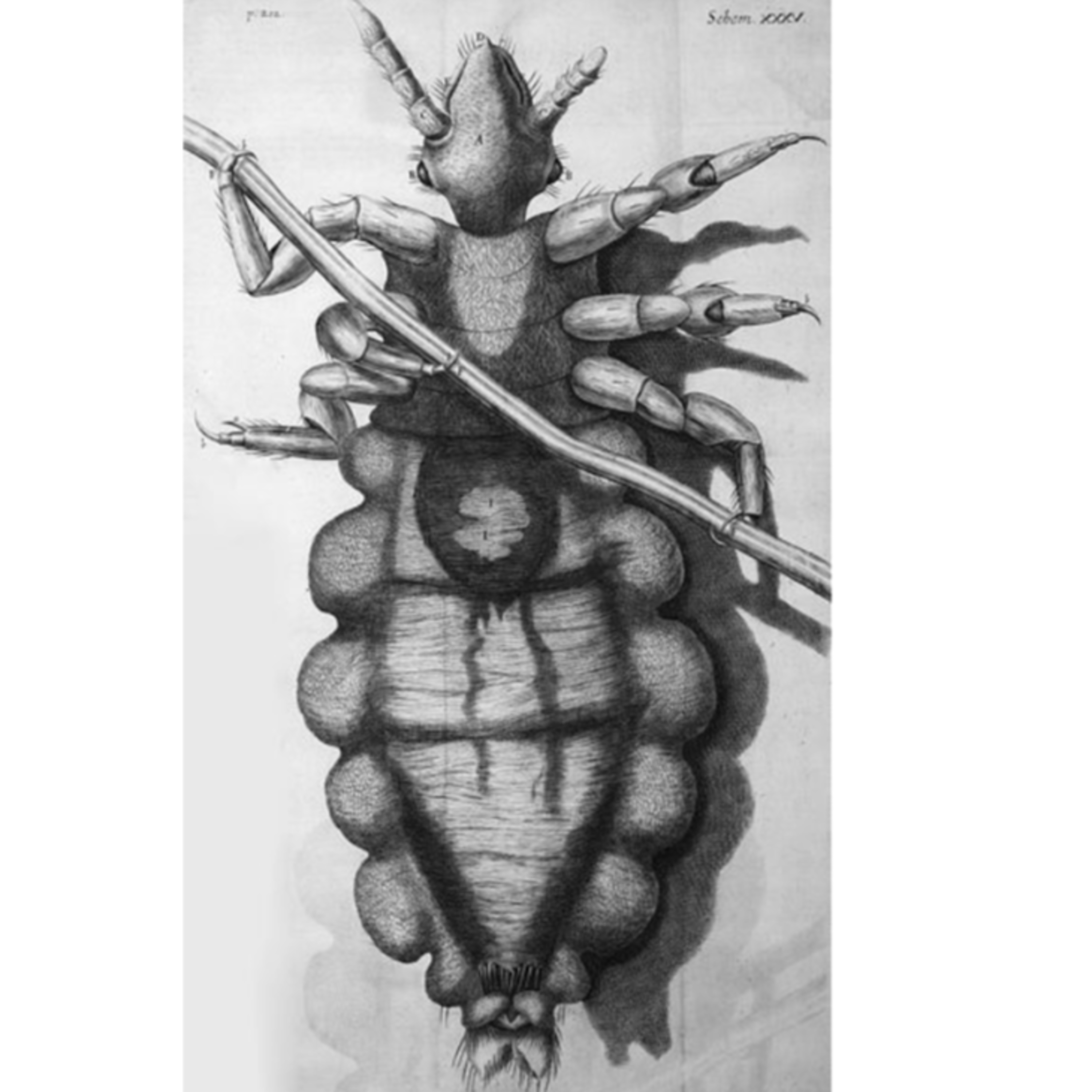
Infectious HistoriansEpisode 76 - Vermin with Lisa SarasohnLisa Sarasohn (Oregon State University) joins the Infectious Historians to discuss her forthcoming book on vermin since the 17th century. The interview begins with an overview of what vermin are - and how different animal species have been included or excluded throughout the years. The conversation then moves to touch upon early modern conceptions of vermin which eventually led to the stereotyping of human groups as verminous or vermin in the context of colonialism and imperialism. Lisa also expands on two specific species of vermin - lice and rats - before tying the discussion to Covid.
2021-09-051h 03
Infectious HistoriansEpisode 75 - Translational Humanities with Kirsten OstherrKirsten Ostherr (Rice University) joins Merle and Lee to discuss the role of the humanities in the context of Covid, in particular in an applied sense. The interview begins with an overview of Kirsten’s project and a few examples of current work in the applied humanities that attempts to address Covid. Kirsten notes how her background has helped her reconsider and reframe the traditional roles of the humanities in this context, and continues to highlight some of the limits and challenges the humanities must face in the 21st century mediascape. She also comments on some ideas to increase th...
2021-08-291h 06
Infectious HistoriansEpisode 74 - Smallpox, Inoculations, and the American Revolution with Andrew WehrmanAndrew Wehrman (Central Michigan University) talks to Merle and Lee about the importance of public health, especially smallpox and inoculations, during the American Revolution. After first orienting listeners to the political situation in North America, Andrew discusses differences between public health in Britain and the colonies, along with how the colonists used quarantine and isolation to stop the spread of smallpox. He then discusses the importance of inoculation in preventing smallpox on a broader scale, along with how the movement of armies during the Revolution led to more demand for more readily available inoculation even for the poor (although...
2021-08-201h 04
Infectious HistoriansEpisode 73 - Disease Studies Reflections during CovidMerle and Lee have a reflective episode. The discussion begins with disease studies in academia during the pandemic in attempt to understand to what extent has the pandemic changed the ways in which scholars in the humanities and in particular history departments work on disease. When will things change? Should we expect a paradigm shift anytime soon? The conversation then moves towards resilience as a concept. Is it desirable or just a fuzzy buzzword? Merle and Lee also discuss the pros and cons of outreach and attempts to influence policy before transitioning to a brief discussion about the future...
2021-08-1453 min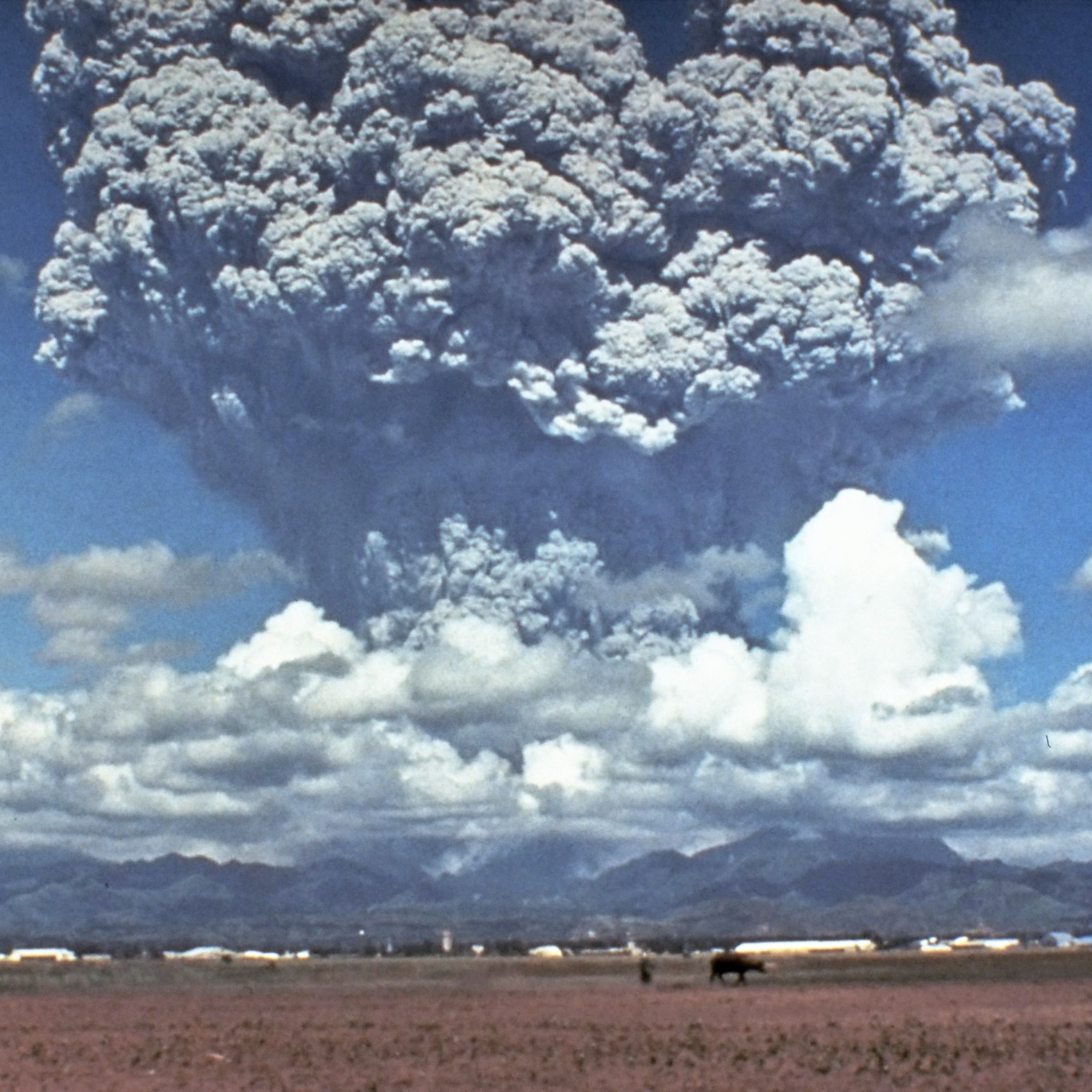
Infectious HistoriansEpisode 72 - Climate Change and the Globalization of Disease in the Early Middle Ages with Tim NewfieldTim Newfield (Georgetown University) talks to Merle and Lee about the connected histories of climate change and diseases that become pandemics, focusing on the early medieval and late antique periods. Tim opens by discussing the global cooling events starting in 536 and how researchers know they happened through various proxy datasets, such as tree rings, along with how historians should approach using these types of natural sources. He then talks about the long-term climate cooling event, the Late Antique Little Ice Age, along with its supposed connections to the outbreak of the Justinianic Plague in 541. Tim also talks about why...
2021-08-061h 05
Infectious HistoriansEpisode 71 - Zombie Films with Todd PlattsTodd Platts (Piedmont Virginia Community College) joins Merle and Lee to discuss his work on zombie films over the past half century. He begins by offering a history of zombie movies and the changing features and definition of the zombie. Todd points to a few key films - in particular George Romero’s Night of the Living Dead and Dawn of the Dead which eventually resulted in the explosion of zombie-related material in the 21st century. The conversation then moves to discuss disease movies more broadly and in particular in the context of Covid - why did these disease mo...
2021-07-301h 04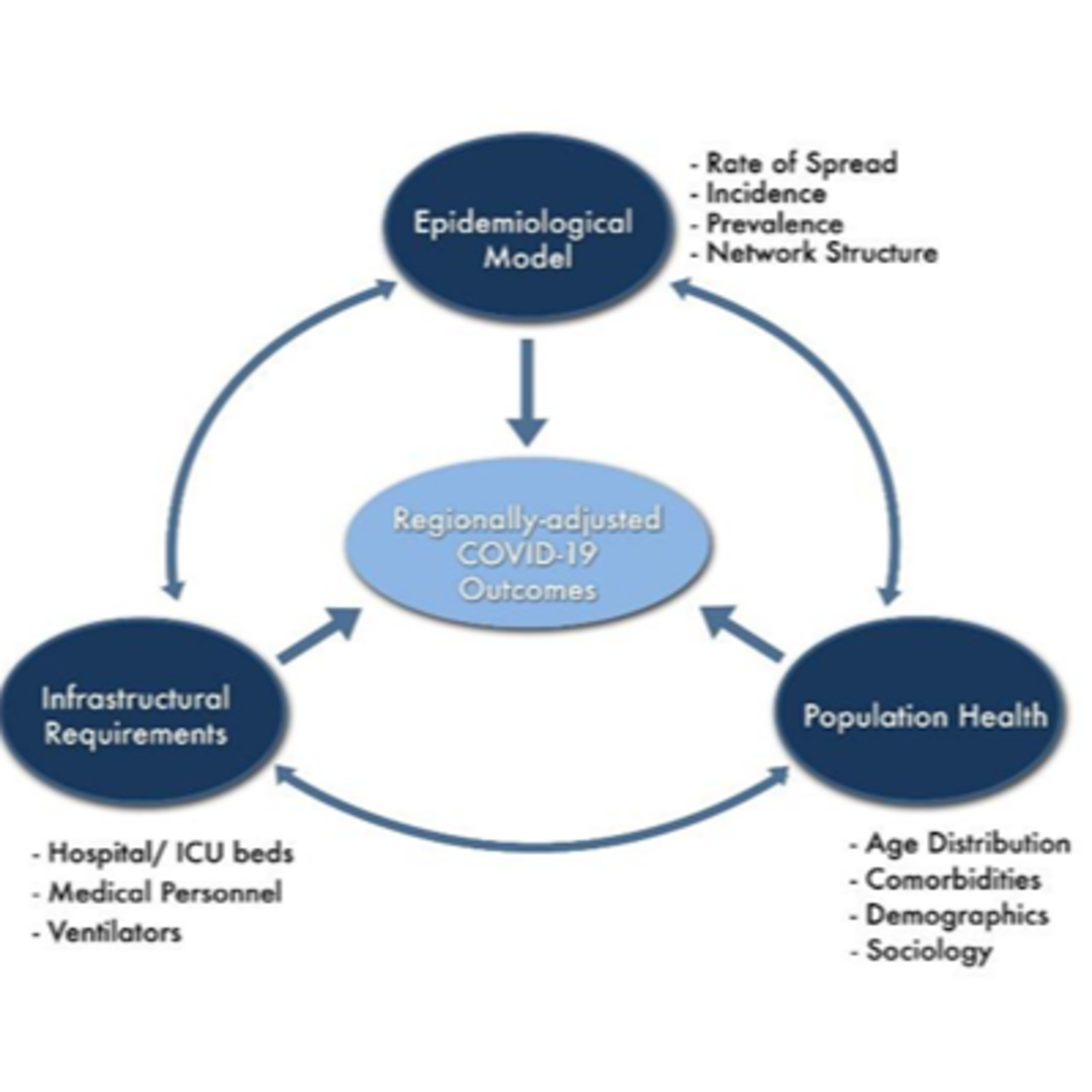
Infectious HistoriansEpisode 70 - Covid, Policy and History with Ben TrumpBen Trump (US Army) joins the Infectious Historians for a wide-ranging conversation. He begins with his public health work before Covid and his path to the US Army. Ben then outlines the Covid pandemic through his experience of working on several related projects, already since January/February 2020. Some of these included how Covid might spread in the US’ Pacific islands to figure out the responses needed there, or how to solve basic questions (such as where would personal protective equipment or ventilators go). Ben also shares his experience in trying to draw connections between historical pandemics and our current ex...
2021-07-231h 06
Infectious HistoriansEpisode 69 - Ottoman Medicines and Disease with Miri Shefer MossensohnMiri Shefer Mossensohn sits down with Merle and Lee to talk about Ottoman history of medicines and disease. She begins by discussing the broad contours of medicine and disease in the Ottoman Empire, which lasted for 600 years. Miri reveals the wide variety of medical individuals and institutions that existed in the Ottoman world, with few standardized systems until the 19th century, that meant people who sought treatment had huge numbers of options. During the conversation, she offers numerous examples of how infectious diseases were constantly around and accepted, leading to little proactive government policy. At the end, Miri discusses...
2021-07-161h 08
Infectious HistoriansEpisode 68 - Persecution of minorities during the Black Death with Tzafrir BarzilayTzafrir Barzilay (Ben Gurion University of the Negev) joins Merle and Lee to discuss persecution of minorities and in particular Jews before and during the Black Death. After some background on the Black Death, Tzafrir uses the case study of Strasbourg to demonstrate how persecutions of minorities could be deeply embedded in local politics. The conversation touches upon some of the practicalities of blaming Jews and other minorities for disease epidemics, and Tzafrir differentiates between well poisoning and other types of accusations such as ritual murder and host desecration. Near the end of the interview, the conversation reflects on...
2021-07-0956 min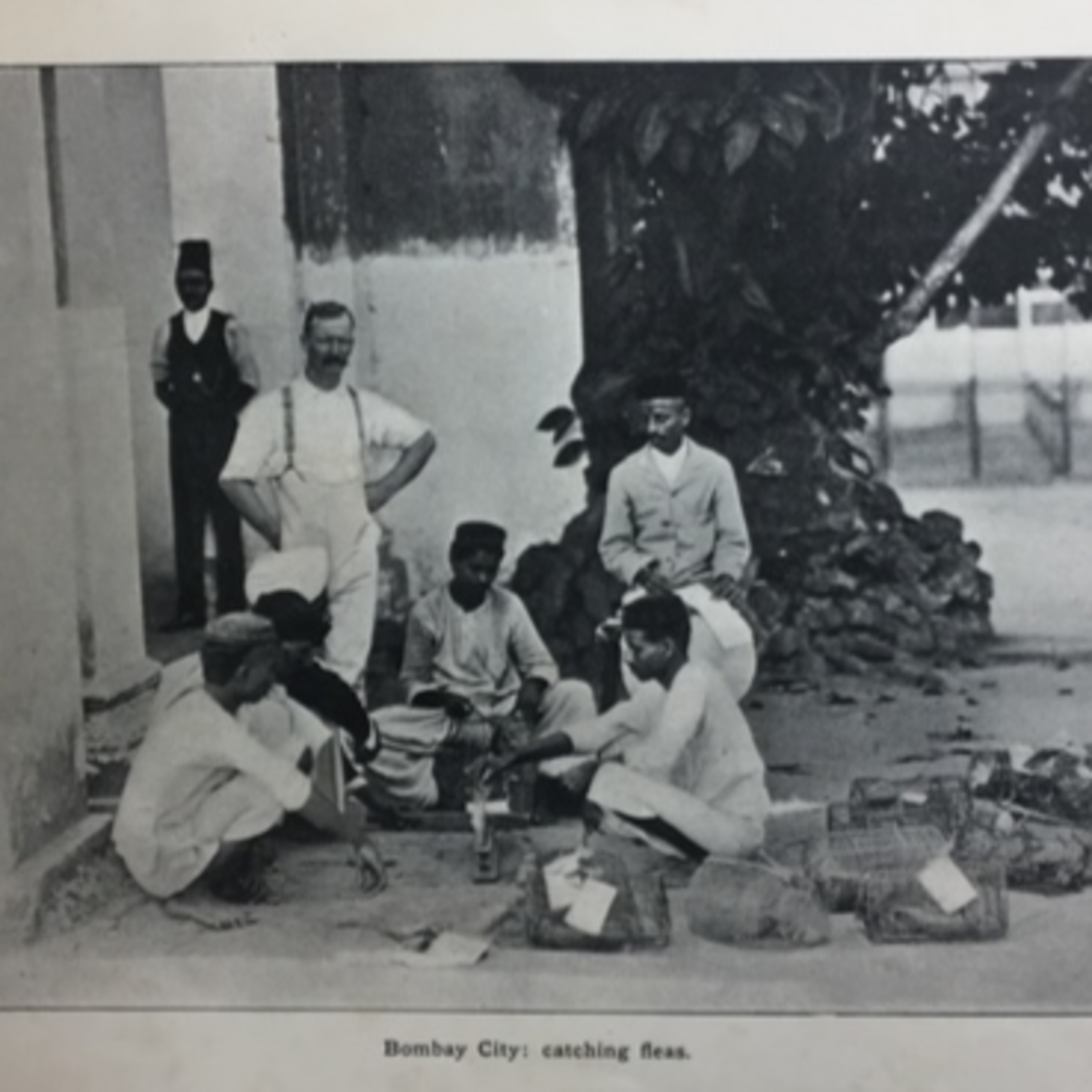
Infectious HistoriansEpisode 67 - Plague in Bombay and Urban Ecology with Emily WebsterEmily Webster (University of Chicago) joins Merle and Lee to discuss the significant plague outbreaks in Bombay during the Third Plague Pandemic of the turn of the 20th century and the place of environmental history in studying disease. After first surveying the Pandemic and its particular impact in Bombay, Emily discusses why the experience of Bombay was central to how plague was conceptualized across the British Empire and the world. She then explains the importance of urban ecology to understanding the severity of these outbreaks, along with how sanitary measures in Bombay exacerbated the spread of plague, rather than...
2021-07-021h 02
Infectious HistoriansEpisode 66 - Early Modern Pandemics, Quantitative Research and Inequality with Daniel CurtisDaniel Curtis (Erasmus University Rotterdam) talks to Merle and Lee about his diverse work that touches upon multiple disease-related fields. After an overview of the timeframe in which Daniel works - the late medieval and early modern periods, the conversation moves to a discussion of scholarly collaboration in the humanities. Daniel then discusses the benefits and challenges in quantitative work, especially in premodern contexts, and points out that few scholars reflect upon the biases in the datasets. These issues are connected to Daniel’s current project, which looks at inequality in the aftermath of premodern pandemic. The end of th...
2021-06-251h 00
Infectious HistoriansEpisode 65 - Scientific Freedom, the Cold War, and Communicating Science with Audra WolfeAudra Wolfe talks to Merle and Lee about her work on scientific freedom during the Cold War and how it still shapes ideas about objectivity and politics in science to the present. After framing the discussion about the Cold War, Audra explains the notion of scientific freedom that supposedly allowed scientists to develop their own research agenda without state interference, which was created in opposition to the Soviet scientific system. She then discusses how this myth was made, especially in light of the Manhattan Project among other examples. Audra then moves on to discuss science, objectivity, and the idea...
2021-06-181h 03
Infectious HistoriansEpisode 64 - Commerce, Capitalism, and the Making of Modern Medicine with Zachary DornerZachary Dorner (University of Maryland) comes on to discuss his new book, Merchants of Medicine, which discusses the role of merchants, commerce, and capitalism in changing how medicine was made, administered, and thought about across the 18th century. Zack discusses the ideas about medicine before the 18th century and then highlights the dramatic changes in commerce and capitalism that shaped how people consumed and thought about what medicine should do by the end of the century. He highlights the role of early modern states and the development of what would become pharmaceutical companies in this process, while linking these...
2021-06-111h 03
Infectious HistoriansEpisode 63 - How Plague was Taught during a Pandemic with Janet KayJanet Kay (Princeton) returns to the Infectious Historians to discuss her promised after action report on teaching her 100 person course, The Art & Archaeology of Plague, at Princeton University. After reminding listeners about the structure of the course, Janet discusses two key features: plague simulations and the guest lecturers from around the world (including using an episode of the Infectious Historians!). She talks about what worked in the course, what students liked and struggled with, and the amazing work her teaching assistants did. At the end, Janet reflects on how she will teach the course again in a few years...
2021-06-0452 min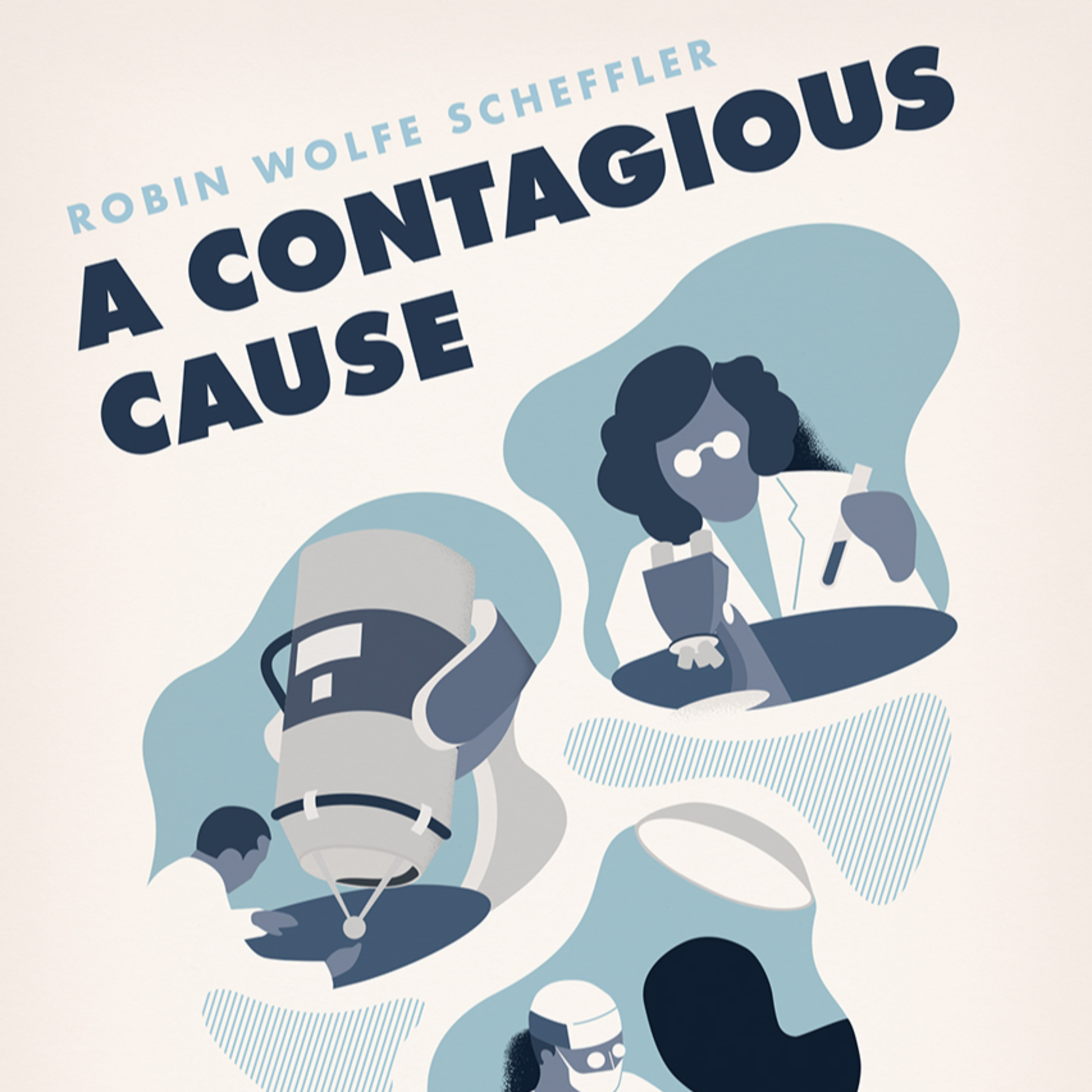
Infectious HistoriansEpisode 62 - Cancer with Robin SchefflerRobin Scheffler (MIT) joins the Infectious Historians to discuss his recent book on cancer. Robin begins the interview with a broad discussion of cancer and the different ways it was perceived and conceptualized over the past century. The discussion touches upon topics such as the so-called “war” on cancer and its meaning; cancer and gender; some of the trends and individuals involved in cancer research; and finally, government involvement in cancer research and some of the factors that influence it.
2021-05-281h 02
Infectious HistoriansEpisode 61 - Lyme Disease and Long Term Symptoms with Abigail DumesAbigail Dumes (University of Michigan) sits down to talk to Merle and Lee about her anthropological work on Lyme Disease and how it has shaped ideas about long term disease effects on people. After defining Lyme Disease and why its numbers have increased over the last few decades, she turns to the debate over clinical diagnosis of the disease and those who have experienced long term symptoms. Dumes traces out the significant implications of this debate and how it might change disease diagnoses and responses in the future. Finally, she discusses how her work on Lyme Disease can have...
2021-05-2156 min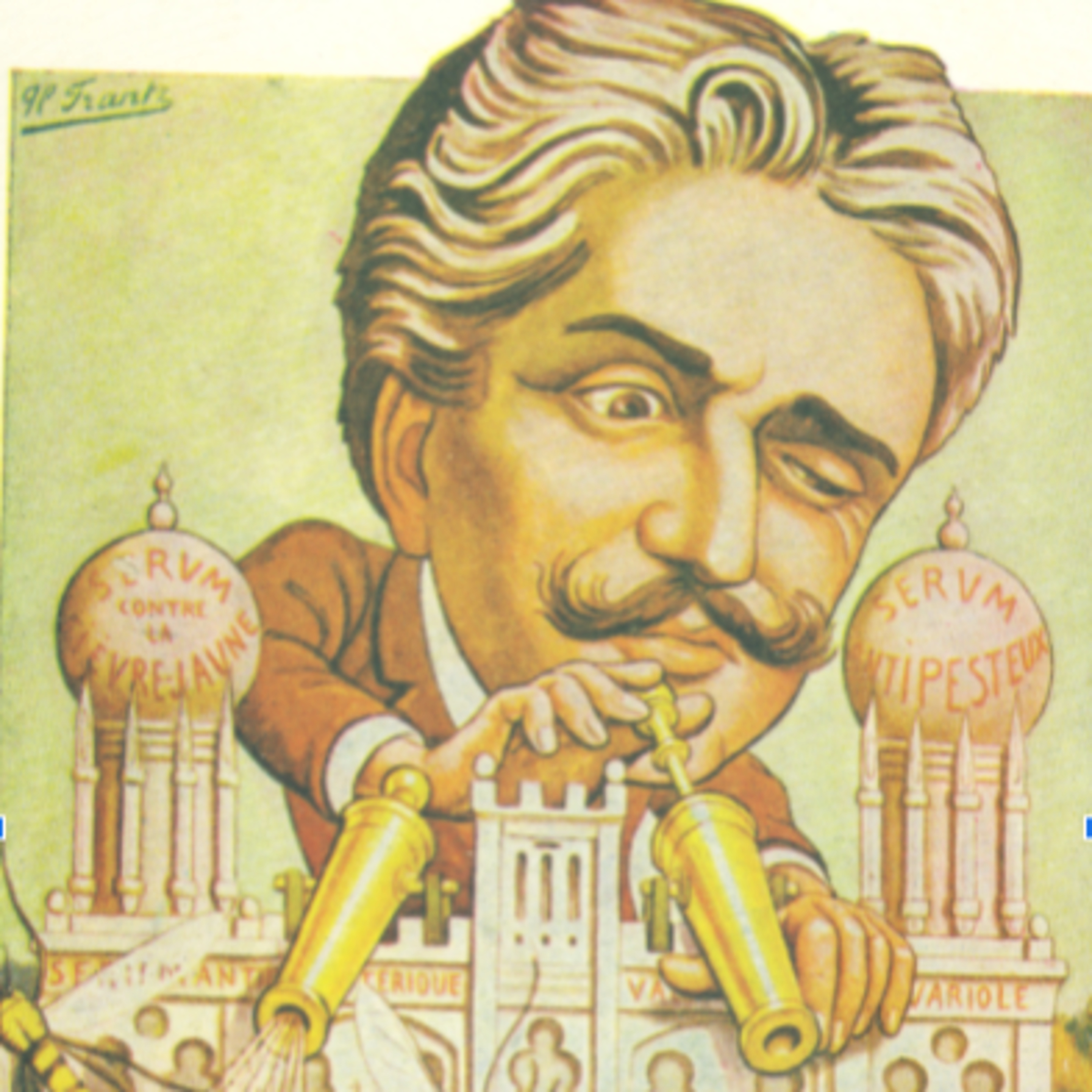
Infectious HistoriansEpisode 60 - Plague and Microbiology in Brazil with Matheus DuarteMatheus Duarte (University of St. Andrews) comes on the podcast to talk to Merle and Lee about his work on turn of the 20th century plague in Brazil and its impact on creating the field of microbiology. After a brief introduction to disease history in Brazil at the time, Matheus discusses the impact and immediate non-medical responses to the plague outbreak in Brazil and their implications for global events. He then discusses the use of pharmaceutical responses - vaccines and serums - in Brazil and their subsequent use in other places around the world, particularly India. At the end...
2021-05-141h 01
Infectious HistoriansEpisode 59 - COVID Calls with Scott KnowlesScott Gabriel Knowles (Korea Advanced Institute of Science and Technology) joins Merle and Lee to talk about his daily show since March 2020, Covid Calls. Scott begins by providing background to his show, the guests he has had on, and his audience’s responses to the show. He then discusses some of the broad themes he has learned during his 269 shows (as of our taping), including the importance of local context during Covid and the ways in which new themes continue to emerge over the past fourteen months. At the end, he lays out a hopeful vision of what his wo...
2021-05-071h 06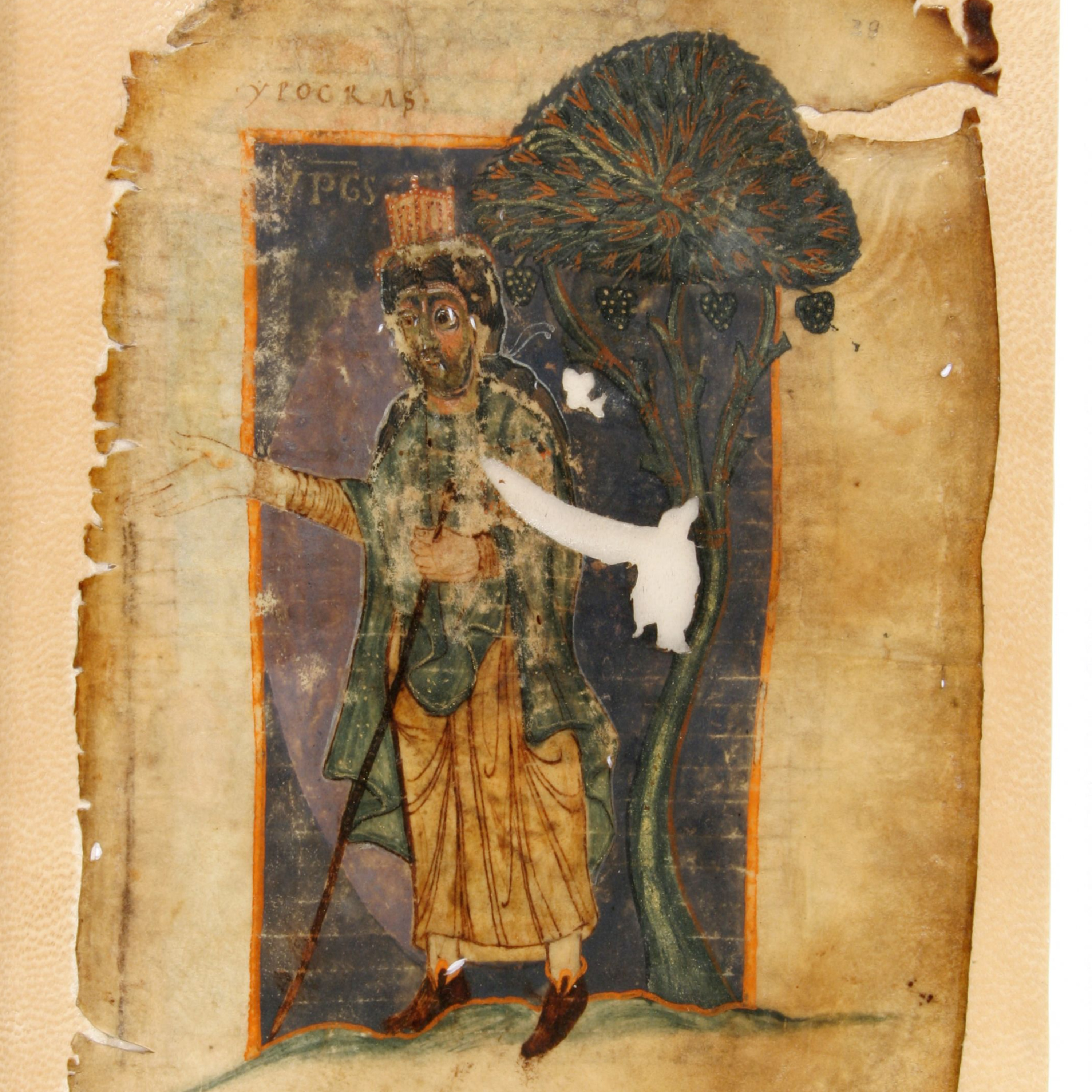
Infectious HistoriansEpisode 58 - Carolingian Medicine with Meg LejaMeg Leja (SUNY Binghamton) joins Merle and Lee to discuss her work on early medieval medicine and the Carolingians. Meg begins the conversation by situating the Carolingians historically and explaining why they have been written out of the “standard” story of history of medicine. She continues by discussing how the Carolingians thought about health and medicine, while also pointing out some of the issues of concern - and innovations - of the Carolingian period. Among the topics that come up are the supposed dichotomy between “medical” knowledge and “religious” ideas and the extent to which these ideas were held among contem...
2021-04-3055 min
Infectious HistoriansEpisode 57 - Historical Epidemiology with Jim WebbJim Webb (Colby College) comes on the podcast to talk to Merle and Lee about his work in historical epidemiology and how its multidisciplinary approach could transform how we teach and research diseases. After first defining what historical epidemiology is and why it is a difficult field in which to do research, Jim gives examples of how he approached these questions based on his malaria research in both the recent and deep past. He then turns to how research on diseases works today and how historical epidemiology could help transform research, teaching, and academia as a whole moving forward...
2021-04-241h 10
Infectious HistoriansEpisode 56 - Historical Demography of Infectious Diseases, Policy and Outreach with Svenn-Erik MamelundSvenn-Erik Mamelund (OsloMet) joins Merle and Lee to discuss his work. The first part of the interview focuses on Svenn-Erik’s research as a historical demographer focusing on the 1918 influenza pandemic, and he shares some of the findings about the differential effects of the pandemic on certain groups in the population. In the second half, the conversation moves to discuss Svenn-Erik’s experiences using his research to influence policy in the context of the Covid pandemic, and more broadly conducting outreach. Svenn-Erik shares some of his ideas and suggestions about both policy and outreach.
Fore additional material click...
2021-04-161h 20
Infectious HistoriansEpisode 55 - Polio in Hungary and the End of Epidemics with Dora VarghaDora Vargha (University of Exeter) talks to Merle and Lee about her work on polio epidemics after World War Two in Hungary. After unpacking the basic information on polio’s longer history, Dora discusses how polio struck Hungary during the 1950s and the way in which vaccines were introduced that stopped the epidemics by the 1960s. She uses polio as a lens to reveal some of the shifting gaps in the Iron Curtain, where east and west worked together to stop these deadly epidemics. Dora then talks about how her work on polio has led her to reconceptualize how ep...
2021-04-091h 06
Infectious HistoriansEpisode 54 - Alexandre Yersin with Michael VannMichael Vann (California State University, Sacramento) returns to the Infectious Historians (our first returning guest!), this time to focus on the biography of Alexandre Yersin, the Swiss-French doctor who discovered the bacterium that causes plague. The discussion covers Yersin’s biography from childhood, through his move to southeast Asia, his successful career and larger-than-life reputation - alongside the less palatable aspects of Yersin’s life. The conversation also touches upon issues such as Yersin’s entrepreneurship, his life as a European within a colonial context, and his personality.
2021-04-021h 15
Infectious HistoriansEpisode 53 - Joshua Lederberg: Public Science and Re-Emerging Infectious Diseases with Nathan CroweNathan Crowe (U. of North Carolina-Wilmington) comes on the podcast to talk about the life and career of Joshua Lederberg, a key figure in various fields including biology, genetics, and disease from just after World War Two until his death in 2008. Nathan first sketches out Lederberg’s background and his early career, including his work that received a Nobel Prize in 1958 when he was in his mid-30s. He then talks to Merle and Lee about how Lederberg transformed his new status into various public science and governmental policy roles, which also expanded the topics he worked on to in...
2021-03-261h 13
Infectious HistoriansEpisode 52 - 1st Anniversary Episode!Merle and Lee celebrate a full year of Infectious Historians (52 episodes)! They reflect on the past year and the podcast, after re-listening to their not-so-bad first episode. They then survey the broad topics that the podcast covered so far - such as local experiences or disease in popular culture - mentioning some of the guests they interviewed along the way. The conversation then moves on to highlight some of the recurring themes that appeared in the episodes this past year, including Lee’s favorite time period - the turn of the 20th century - and Merle’s favorite -isms such...
2021-03-1952 min
Infectious HistoriansEpisode 51 - Yellow Fever in New Orleans with Urmi Engineer WilloughbyUrmi Engineer Willoughby (Pitzer College) joins the Infectious Historians to discuss Yellow Fever, with a focus on New Orleans over the course of the 19th century. Urmi first talks about the biological, the environmental, and human factors that shaped the spread of Yellow Fever from Africa to the Americas across the last few centuries. She then moves on to discuss its particular importance in the city of New Orleans with its differential effects on inhabitants depending on race and class in particular. Finally, she talks about questions of immunized people who survived Yellow Fever along with the ways in...
2021-03-1257 min
Infectious HistoriansEpisode 50 - Ancient Medicine and Heresy with Jessica WrightJessica Wright (University of Sheffield) joins the Infectious Historians team to discuss ancient medicine. The conversation begins with a definition of ancient medicine (and a reflection upon its meaning), as well as considering how ancient practitioners conceived of infectious diseases and infection. The discussion then moves to Christian heresies, which Jessica explains and connects to her own work that shows how certain ancient writers such as Augustine understood these Christian heresies as mental illnesses. At the end, Jessica reflects on the use of mental health related language in the present as a way to discredit one’s (often political/id...
2021-03-051h 04
Infectious HistoriansEpisode 49 - The Medieval Translation Movement and Late Ancient Medical Texts with John MulhallJohn Mulhall (Harvard University) joins the Infectious Historians to talk about the famous medieval translation movement and his own work on late antique texts. John first talks about what the translation movement was (and was not) along with how it worked and why it is so central to histories of medicine, science, and philosophy. In the second part of the episode, John turns to his own work on late ancient medical texts that were innovative in their understanding of medicine, disease, and especially plague as reactions to events happening in the world. At the end, he reflects upon what...
2021-02-261h 01
Infectious HistoriansEpisode 48 - Black workers in the US Military: Immune or Infectious? with Khary PolkKhary Polk (Amherst College) joins the Infectious Historians to talk about his recent book on African-American workers in the US military, particularly in the context of their perceived immunity to certain infectious diseases such as Yellow Fever. The conversation touches upon several related topics, such as patriotism and gender roles in the military. Khary also describes how racial thinking shifted over time, and how African-American troops were (mis-)treated within the military over the first half of the twentieth century. The conversation concludes with the potential links between Khary’s research and the Covid pandemic
2021-02-181h 06
Infectious HistoriansEpisode 47 - HIV/AIDS: Patient Zero, History, and Popular Culture with Richard McKayRichard McKay (University of Cambridge) talks to Merle and Lee about his work on the history of the HIV/AIDS epidemic, with a particular focus on Patient Zero and the history of the disease. After speaking about the problematic idea of the term Patient Zero, including its chance development, he discusses the early history of the epidemic and its popularization in broader public culture. He then turns to how these public perceptions of HIV/AIDS, and Covid, shape policy responses to disease along with some possible ways forward for historians to engage in public work in the future.
2021-02-111h 11
Infectious HistoriansEpisode 46 - Ancient DNA and Paleogenetics with Stephanie MarciniakStephanie Marciniak (Penn State University) joins Merle and Lee to discuss some of the fascinating developments in studying historical diseases from a scientific perspective: ancient DNA and more broadly paleogenetics. Stephanie provides some context for this research approach, before touching upon several related topics: the process of researching ancient DNA, the diseases that we can (or cannot) identify in human remains, some of the research questions that interest ancient DNA scientists, and a few issues concerning numbers of remains and of positive identifications of disease.
2021-02-041h 08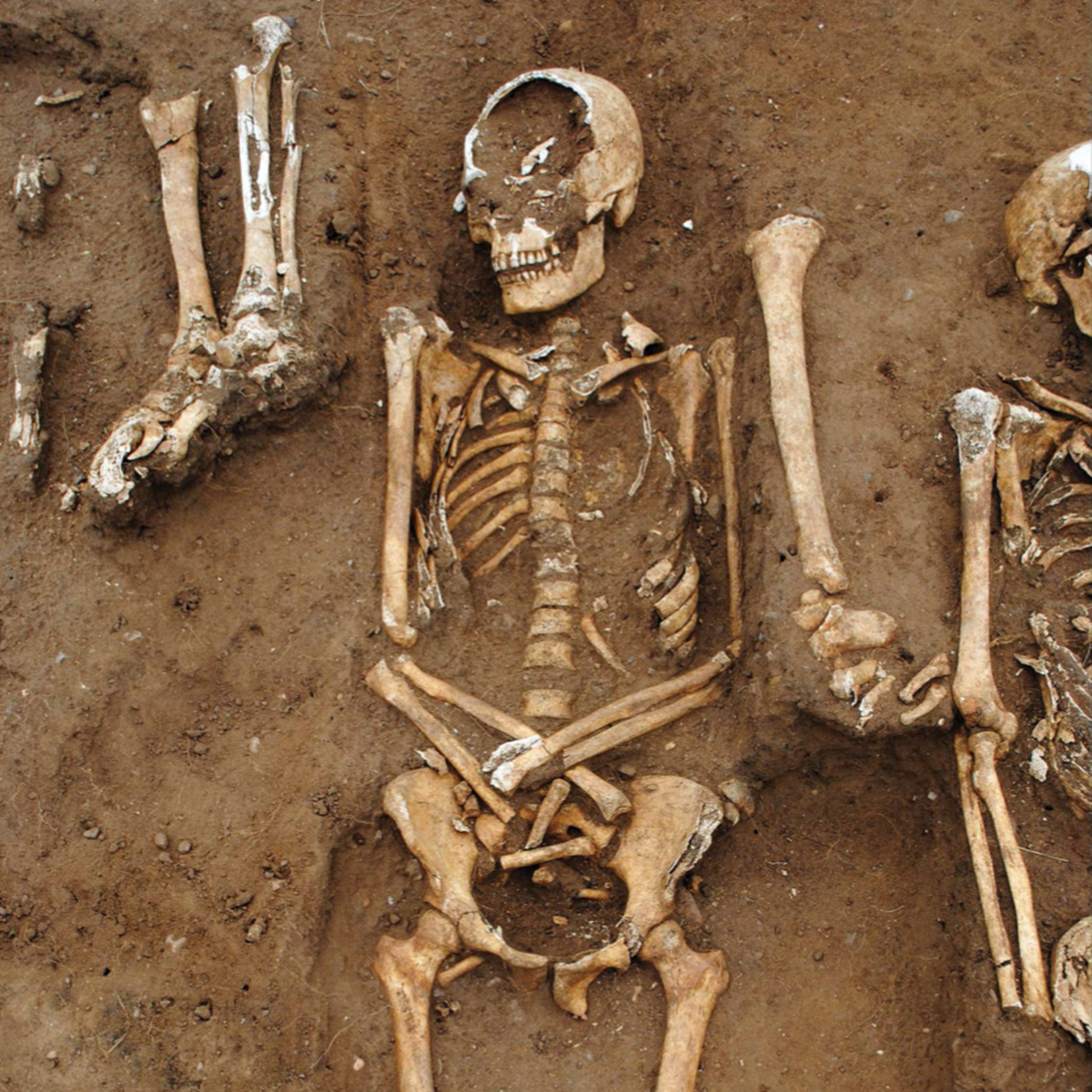
Infectious HistoriansEpisode 45 - Teaching Plagues and Pandemics with Janet KayJanet Kay (Princeton University) talks to Merle and Lee for a special episode about preparing to teach her “Art & Archaeology of Plague” during the upcoming Spring 2021 semester. She discusses her planning for the broad chronological range of her course that runs from the Plague of Athens (c. 430 BCE) to Covid-19, while introducing Plague Simulations, an innovative set of assignments, and several guest lectures by colleagues. Janet then talks about why she thought this was a perfect time to offer a course like this and how she hopes it will help students think about disease and pandemics of the past whil...
2021-01-2952 min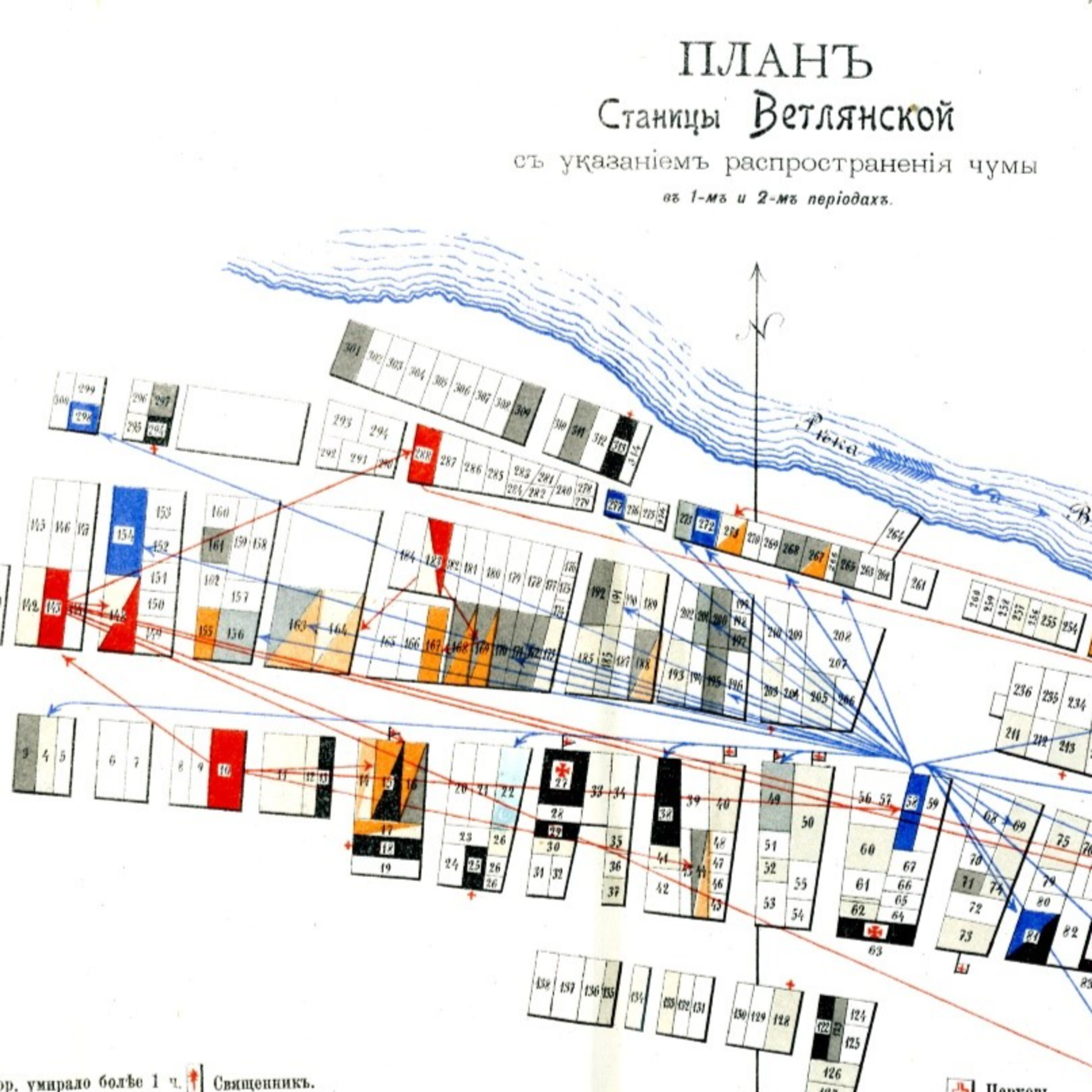
Infectious HistoriansEpisode 44 - Epidemiology and Infectious Disease Models with Lukas EngelmannLukas Engelmann (University of Edinburgh) joins Merle and Lee to discuss the history of epidemiology. The conversation begins by thinking about epidemiology as a discipline as well as the gap between the discipline and scholars who use epidemiology. After discussing the development of epidemiology, including in the context of Covid-19, the interview moves to reflect upon infectious disease models, which have become especially popular in the recent pandemic. Some of the advantages and disadvantages of models are discussed, as well as some of the different approaches in how to evaluate them.
2021-01-211h 11
Infectious HistoriansEpisode 43 - Ebola Outbreaks in West Africa with Adia BentonAdia Benton (Northwestern University) talks to Merle and Lee about the West African Ebola outbreak in 2014 and why that disease in particular has terrified Western audiences since the late 20th century. After discussing the basics on what Ebola is, where it was discovered, and where it is found today, Adia expands upon its recent large outbreak in West Africa. She then examines why so little time was spent on caring for people who got sick with it and why Ebola has such a powerful sway over popular imagination. She then outlines what she calls racial immuno-logic before reflecting on...
2021-01-141h 02
Infectious HistoriansEpisode 42 - The Age of Pandemics in India and the World with Chinmay TumbeChinmay Tumbe (Indian Institute of Management Ahmedabad) talks to Merle and Lee about his new book, The Age of Pandemics, that reveals the story of how three pandemics - cholera, plague and influenza - have significantly affected India over the course of the long 19th century, resulting in episodes of mass mortality. He first discusses some background on all three pandemics and then turns to why they have not had significant historical scholarship on them over the last century. Chinmay then offers thoughts on new ways to approach the history of pandemics moving forward. At the end, he turns...
2021-01-071h 05
Infectious HistoriansEpisode 41 - The Justinianic Plague and the Making of the Plague ConceptMerle and Lee record their final episode for 2020 in which they cover a recently published article of theirs. The article, published in the American Historical Review, examines how scholars thought about the Justinianic Plague over the past century and a half. While the scholarly interpretation of plague increased to include more deaths over a longer period and a wider geographical scope, Merle and Lee argue that a more critical analysis reveals that much of this understanding is based on limited evidence and can be better explained through what they term as “the plague concept” - the difference between what plag...
2020-12-2453 min
Infectious HistoriansEpisode 40 - Forgetting and Remembering the 1918 Influenza Pandemic with Guy BeinerGuy Beiner (Ben-Gurion University of the Negev) talks to Merle and Lee about his work on the memory and forgetting of the 1918 Influenza Pandemic. Guy first provides background about the impact of the Influenza Pandemic and offers an introduction to memory studies and social forgetting while pointing to problems with concepts such as collective memory. During the discussion Guy examines how historical events are remembered, then surveys the different ways academics and the public have discussed the 1918 Influenza in the past century. He highlights key moments that increased attention to the topic, such as the publication of Alfred Crosby’s...
2020-12-181h 07
Infectious HistoriansEpisode 39 - Environmental History: Past, Present, and Future with John McNeillJohn McNeill (Georgetown University) speaks with Merle and Lee about the changes to environmental and disease history over the last half century. After laying out his definition of environmental history, John discusses the background of the field, then reflects on how different chronological and geographical fields use sources along with how this may change moving forward. Following the previous episode, the question of agency of non-humans is raised again. The conversation touches upon other issues as well - collaboration, how it works and how it may change in the discipline of history. The question of engaging public audiences for...
2020-12-111h 10
Infectious HistoriansEpisode 38 - Animals and Epidemics with Susan JonesSusan Jones (University of Minnesota) talks to Merle and Lee about the role of animals in the spread of diseases and how these diseases can spill over from animals to humans. After laying out some background on the topic, she discusses her new work on “Plague Homelands” in Soviet central Asia during the 20th century. Susan talks about how the Soviet state first attempted to eliminate and then control the spread of plague in various regions, with the implications for people, animals, and the environment. At the end, she reflects upon how her unique background, a doctorate in veterinary medi...
2020-12-041h 13
Infectious HistoriansEpisode 37 - The Local Effects of Covid in Kansas City with A.J. HerrmannA.J. Herrmann (Director of Policy for Mayor Quinton Lucas of Kansas City, Missouri) speaks with Merle and Lee about one of their key ideas, the diversity of local experiences during a pandemic, tying it to the present-day experience of Covid in Kansas City since the beginning of the pandemic. AJ begins by laying out the complex regional administrative and political situation of Kansas City, which straddles two states and multiple counties. He then moves on to a discussion of the city’s roll out of its first Covid policies in March and the responses and problems it encountered, as...
2020-11-301h 10
Infectious HistoriansEpisode 36 - Epidemics, the Media, and Collective Memory with Katie FossKatie Foss (Middle Tennessee State University) talks to Merle and Lee about her recently published book on epidemics in the media and collective memory in U.S. history from the early 18th century to the mid-20th century. Katie discusses the changes in media technology and how this shifted the coverage of epidemics across these two centuries. She then turns to how the media plays a key role in shaping narratives along with governments and academic research. The conversation also discusses the media’s role in shaping long-term memories of epidemics and diseases. Finally, Katie discusses what it was li...
2020-11-191h 06
Infectious HistoriansEpisode 35 - Ancient Malaria with David PickelDavid Pickel, PhD Candidate at Stanford University and Director of Excavations, La Villa Romana di Poggio Gramignano Archaeological Project, Lugnano in Teverina, Italy sits down with Merle and Lee to talk about his research on malaria in the ancient world from both a local and a global perspective. He discusses his ongoing archaeological excavation of a child cemetery, which may have been used specifically for victims of malaria. The conversation then turns to how and why historians suggest malaria had a starring role in stopping Attila the Hun and malaria’s use in the fall of Rome narrative. Finally, he...
2020-11-121h 09
Infectious HistoriansEpisode 34 - Vaccinations in China with Mary Augusta BrazeltonMary Brazelton (University of Cambridge) joins Merle and Lee to talk about her work on vaccinations in China in the early and mid-twentieth century. Mary highlights the Chinese governments’ attempts to vaccinate its citizens, including in times of war, and the different options citizens and officials had at their disposal. The conversation also covers science in China and Chinese scientists’ involvement with the global intellectual community. Finally, the discussion touches upon re-introducing China to global pandemic narratives, while at the same time attempting to avoid stereotypical depictions of China as the origin of pandemic.
Furt...
2020-11-091h 07
Infectious HistoriansEpisode 33 - Syphilis and Sexual Health in the United States (1890-1940) with Elliott BowenElliott Bowen (Nazarbayev University) joins Merle and Lee to discuss his work on sexual health more broadly. The conversation focuses on syphilis, a venereal disease, between the late 19th and mid-20th centuries in the United States. The disease itself is first put into its social and cultural contexts. One of the most popular centers for the treatment of syphilis at the time was Hot Springs, Arkansas. Elliott outlines some of the experiences of people who came to visit the city, ranging from frequent scalding-hot baths to mercury treatment. The different experiences of underrepresented groups are also touched upon...
2020-10-291h 11
Infectious HistoriansEpisode 32 - Typhoid Fever and Epidemiology in Victorian England with Jacob Steere-WilliamsJacob Steere-Williams (College of Charleston) discusses the role of typhoid fever in Victorian (19th century) England as a key reason for the development of epidemiology. The chat begins with some background about typhoid and its effects along with comparisons to other diseases such as cholera and plague. Jacob then surveys how epidemiology developed over the course of the late 19th century and its place in history, discussing how it has been forgotten compared to bacteriology and Germ Theory. At the end, Jacob briefly chats about the place of epidemiology today and the place of England in the study of...
2020-10-231h 12
Infectious HistoriansEpisode 31 - Indigenous Perceptions of Disease: Smallpox in Mexico with Tara MalangaTara Malanga (Rutgers University) comes on the podcast to discuss her research on colonial Mexico. The conversation begins with a survey of smallpox and the situation in the New World just before Columbus, then examines smallpox after Contact. Tara describes some of the sources and methodology she uses in her research, and describes some of the ways indigenous populations understood the new infectious diseases they encountered, particularly in the sixteenth century. In the post-interview reflection session, Merle and Lee discuss meta level academic research, comparing their own field and discipline to others.
Visit our website for the...
2020-10-1654 min
Infectious HistoriansEpisode 30 - Smallpox, Slavery, and Vaccinations with Elise MitchellElise Mitchell (NYU) sits down to talk to Merle and Lee for the second episode of their mini-arc on vaccines and vaccinations. They discuss the impact of smallpox and forced inoculations on enslaved people during the 17th and 18th centuries, the experiences of enslaved people during this process, and governmental and non-governmental responses to epidemic outbreaks. At the end, Elise talks about the importance of her work during the ongoing Covid-19 pandemic.
This episode concludes our two-episode mini-arc on vaccinations, and we recommend listening to them both if you’re interested in the topic!
2020-10-091h 03
Infectious HistoriansEpisode 29 - Vaccinations and anti-Vaxxers with Jim HarrisJim Harris (Ohio State University) joins Merle and Lee to offer an overview of the development of vaccinations since the first smallpox vaccine in the late 18th century. The discussion touches upon pre-18th century practices for treating smallpox, before examining the spread in vaccination use. The second part of the interview moves to discuss anti-vaccination ideas and movements in their socio-cultural contexts. Finishing at the present, it covers the main factors influencing anti-vaccination as the group attempts to understand it as a historical phenomenon.
2020-10-0547 min
Infectious HistoriansEpisode 28: The Great Hanoi Rat Hunt with Michael VannMichael Vann (California State University, Sacramento) talks to Merle and Lee about the arrival of the Third Plague Pandemic in colonial Vietnam that led to the Great Hanoi Rat Hunt. Michael tells the amazing and amusing story of how colonial administrators put out bounties for killing rats in an effort to stop the spread of plague, and the surprising results of that approach. The story sheds light on questions of colonialism, racism, and imperialism. Michael also talks about the process of turning his academic article into a graphic history and the public outreach and responses to it.
2020-09-251h 11
Infectious HistoriansEpisode 27 - Sleeping Sickness in East Africa with Mari WebelMari Webel (University of Pittsburgh) discusses the impact of sleeping sickness at the turn of the 20th century in East Africa. Mari talks about the role of sleeping sickness both before and after European colonization and how this disease shaped public health more broadly. She also speaks about the experience of local inhabitants during imperial efforts to stop sleeping sickness. The conversation also covers African history, thinking about how it is taught and researched, while considering the sources that researchers use.
Photo Credit: Courtesy of the Robert Koch Institute, Berlin
2020-09-171h 09
Infectious HistoriansEpisode 26 - Playing Pandemic: Infectious Diseases in GamesMerle and Lee consider games that feature infectious diseases in multiple media. After a brief overview of types of games and references to games that feature infectious diseases as part of their plot, the conversation focuses on two popular and successful, yet very different pandemic games where the infectious disease pandemic is central to the game: Pandemic and Plague Inc. Pandemic is a cooperative board game in which players have to quickly find cures for a few threatening diseases while avoiding too many disease outbreaks around the world. Plague Inc is a single player video game (also an app...
2020-09-1442 min
Infectious HistoriansEpisode 25 - Germ Theory and Popular Culture with Nancy TomesNancy Tomes (Stony Brook) talks to Merle and Lee about how Germ Theory was developed in the second half of the 19th century and how the public learned of it through advertising and other forms of mass media. Nancy also talks about the central role of women in this process alongside how ideas about germs changed over the 20th century. Other topics they discuss are the centrality of the AIDS pandemic to these later developments and how some of the ideas to reduce the spread of germs that seemed outlandish at the turn of the 20th century have returned...
2020-09-041h 11
Infectious HistoriansEpisode 24 - The Outbreak Narrative with Priscilla WaldPriscilla Wald (Duke University) joins Merle and Lee to discuss the “outbreak narrative” she outlined in her influential book Contagious. After defining the outbreak narrative as a common way to understand infectious disease outbreaks, the conversation moves to examine where the outbreak narrative is used, and why has it been so popular for so long. Other topics covered include the relationship between zombie stories and the outbreak narrative, whether COVID fits the narrative, and why there are - perhaps - reasons for post-COVID optimism.
2020-08-271h 06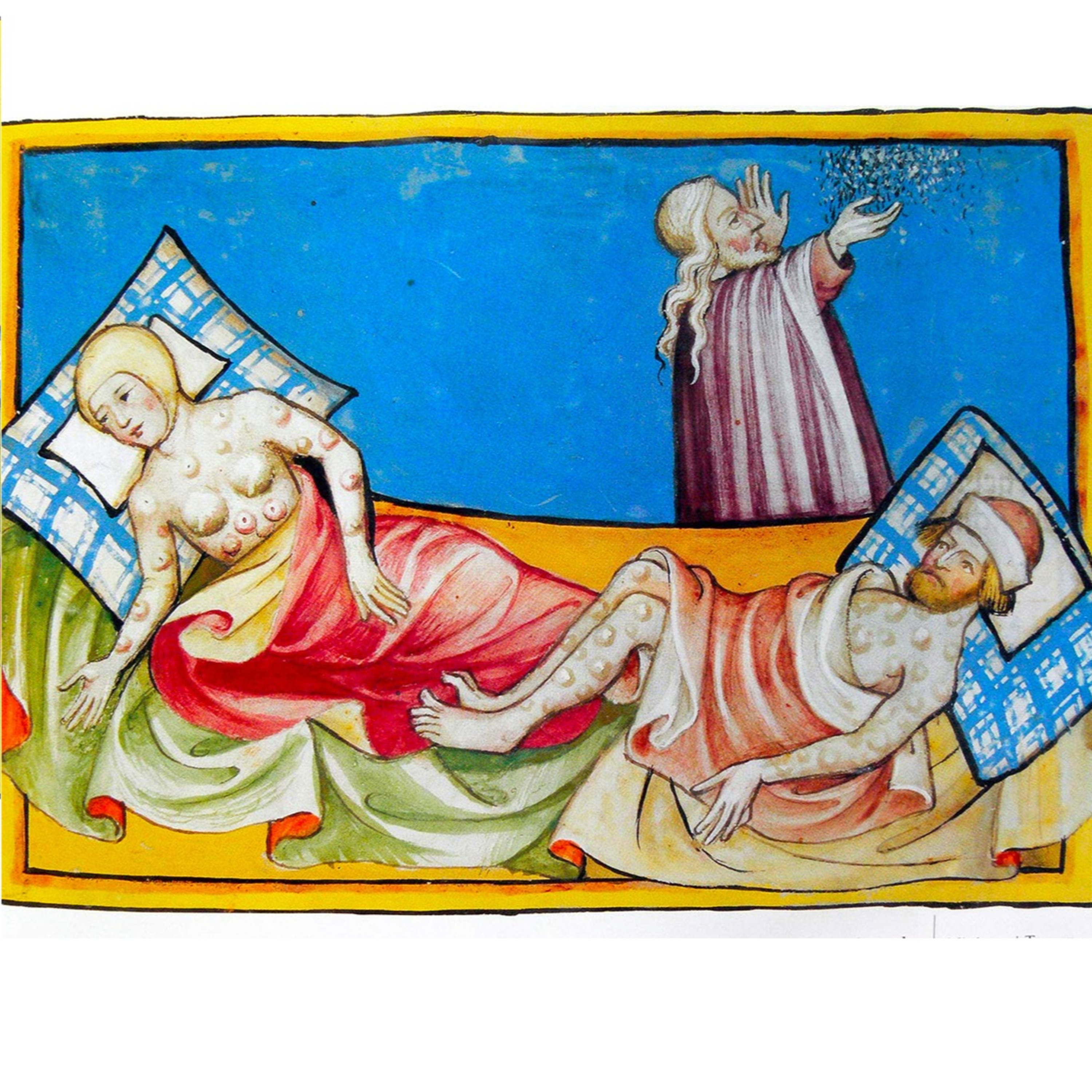
Infectious HistoriansEpisode 23 - Myths and Legends about the Black DeathMerle and Lee chat about four myths that have repeatedly circulated in popular media about the effects of the Black Death: it was an economic leveler that ended feudalism, it led to the Renaissance, it created modern public health, and it changed intellectual ideas about medicine. They reflect upon why these myths remain popular, since they are based upon causal ideas of history where one big event leads to another and changes the world, despite historians demonstrating their problems for decades. These myths exist across all media - this episode’s cover image, for example, is often used to ac...
2020-08-2138 min
Infectious HistoriansEpisode 22 - Virology Research Developments with Vincent RacanielloVincent Racaniello (Columbia University) joins the podcast to discuss virology. The conversation includes trends and developments in virology over the past few decades. Vincent discusses the importance of vaccines in preventing pandemics, and offers an overview of the connections between politics, industry and research. Multiple references throughout the conversation touch upon the research, collaboration and potential effects of COVID-19. During the reflection section, Merle and Lee are joined by Infectious Historians’ new research assistant Tori Zirul, who offers her own take on the conversation with Vincent and its implications as well as on science outreach.
2020-08-131h 09
Infectious HistoriansEpisode 21 - Iran in the Age of Cholera with Amir AfkhamiAmir Afkhami (George Washington University) talks to Merle and Lee about the 19th and early 20th century outbreaks of cholera in Iran. He begins with a broad overview of recent Iranian history in the context of infectious diseases, and continues to discuss how imperialism and colonialism shaped how cholera struck Iran. Amir then shows how modern public health emerged in the country as one of the outcomes of this disease. At the end of the conversation Amir also discusses the wider context of infectious diseases in Iran, including the 1918 Influenza Pandemic and Covid-19.
2020-08-061h 07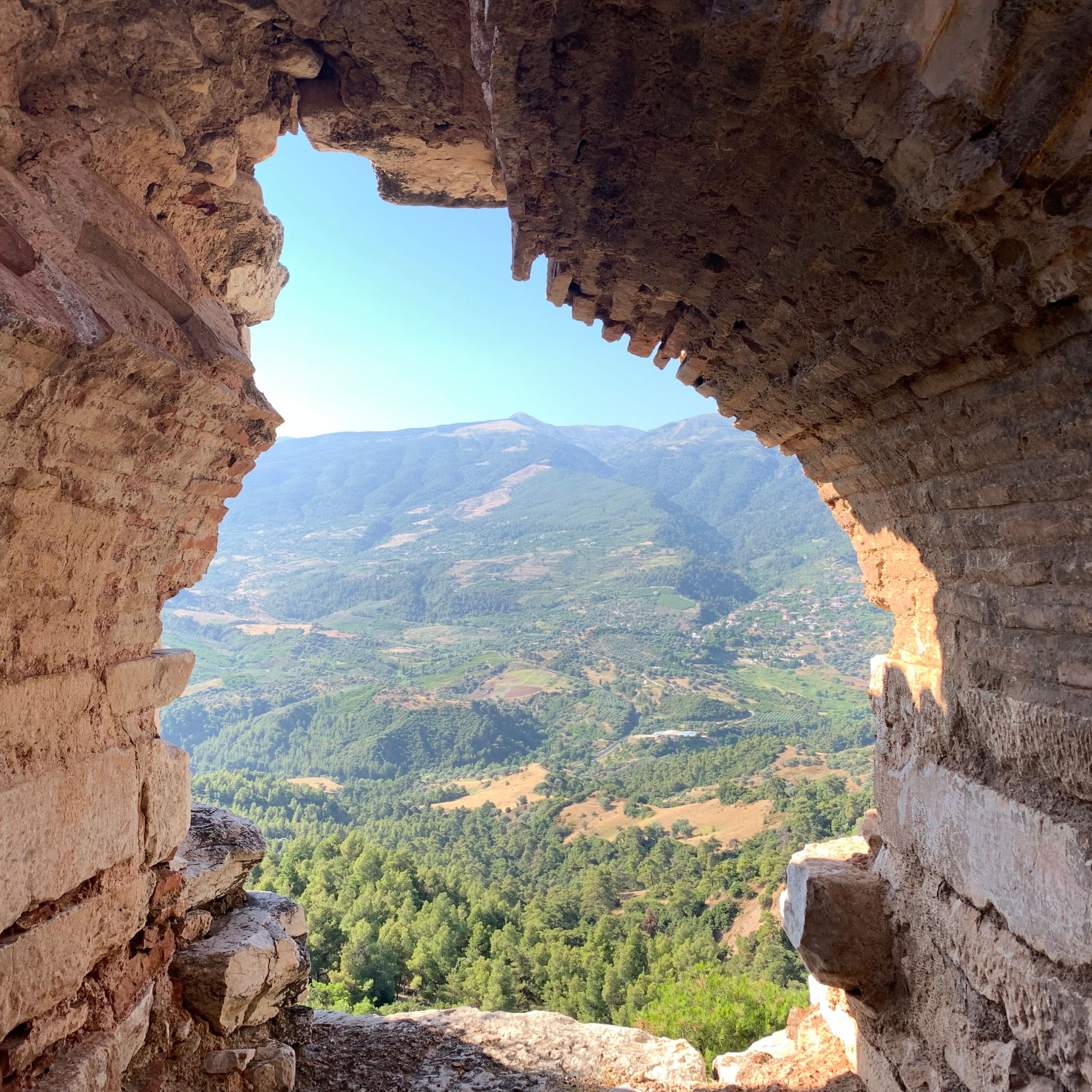
Infectious HistoriansEpisode 20 - Archaeology and Infectious Diseases with Jordan PickettJordan Pickett (University of Georgia) comes on the podcast to talk about archaeology. The first part of the interview covers archaeology, together with its different methodologies and its challenges. In the second part, Jordan suggests different ways in which archaeology might provide evidence for the effects of infectious diseases. Mass graves - in different sites - are discussed, as well as other potential indicators of infectious diseases and their effects. Additional topics include the problem of equifinality, as well as collaboration within and between disciplines.
Image: View from late antique fortifications at Sardis, Western Turkey (credit: Jordan...
2020-07-301h 30
Infectious HistoriansEpisode 19 - Plague and Contagion in the Medieval Islamic World with Justin StearnsJustin Stearns (NYU Abu Dhabi) talks to Merle and Lee about his research on contagion, disease, and plague in medieval Islamic thought. Their conversation touches upon the central role of plague to Islamic thinking, since plague struck during the early conquests and the formation of the Islamic community. Justin also highlights some similarities and differences between studying these topics in the Islamic world and Christian Europe. Finally, he reflects upon how Islamic thinking about plague has been talked about during the Covid-19 Pandemic.
2020-07-241h 04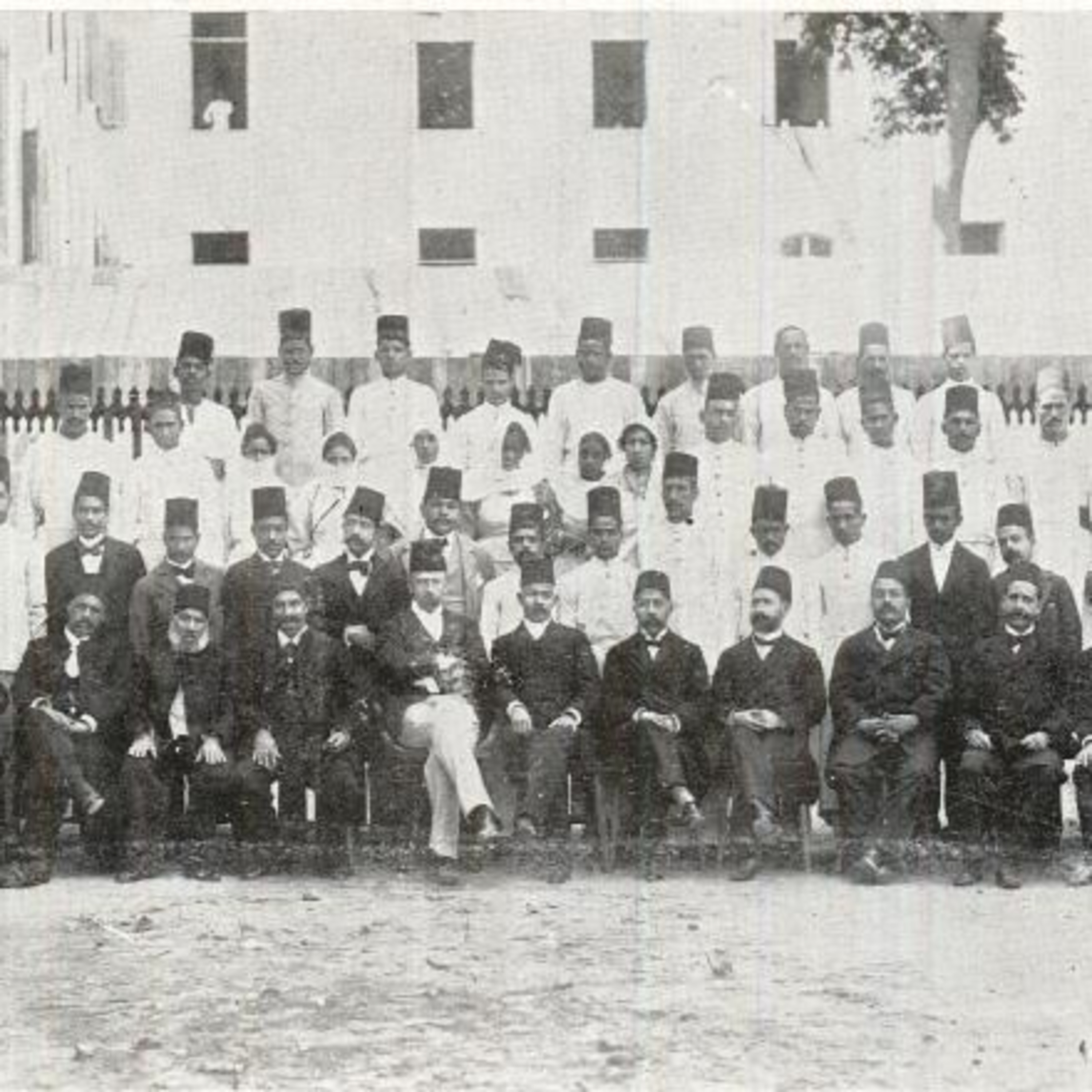
Infectious HistoriansEpisode 18 - Medicine in the Middle East, 1830-1950 with Liat KozmaLiat Kozma (Hebrew University of Jerusalem) speaks about medicine in the modern Middle East using a regional perspective. The conversation discusses the beginnings of modern medicine in the region, the establishment of medicine schools from Istanbul to Baghdad to Cairo, the identity and activities of the practitioners and the health contrasts between urban centers in the region and the countryside. A recurring theme is the continued interaction between the Middle East and the broader world in particular Europe, demonstrated through politics as well as scientific debates. The conversation also covers certain events such as the cholera outbreaks in the...
2020-07-161h 07
Infectious HistoriansEpisode 17 - Resilience and Rebounding from Crises with John HaldonJohn Haldon (Princeton University) talks to Merle and Lee about how states and societies react to systemic crises through the lens of resilience studies. After an introductory discussion about the concept of resilience, they speak about how the Byzantine Empire survived massive political, economic, and military losses during the seventh century and was able to reconfigure its governance to meet new realities. Haldon also discusses why he thinks the later sixth and seventh century outbreaks of the Justinianic Plague did not play a significant role in these changes. At the end, Haldon offers some ways resilience research might be...
2020-07-101h 12
Infectious HistoriansEpisode 16 - Pandemics in Film with Robert AlpertRobert Alpert (Fordham and Hunter College) discusses pandemics in film as a form of popular culture. After an introduction of how to analyze film and whose perspective it conveys, the conversation focuses on two films, Outbreak (1995) and Contagion (2011), and the shifting ways in which each represented its fictional pandemic. Alpert points out the differences and similarities between the movies and our contemporary experience of COVID-19, explains why zombie movies should be considered pandemic films, and explains why he believes movies should not be disregarded because they are “unrealistic”.
2020-07-021h 14
Infectious HistoriansEpisode 15 - Diseases and Native Americans from Colonial Hawaii to Covid-19 with Seth ArcherSeth Archer from Utah State sits down with Merle and Lee to talk about the diseases that passed through the Columbian Exchange and their impact on Native Americans. Archer offers a broad take on how historians have written about diseases after the colonization of North America and then turns to his area of expertise: the impact of disease on Hawaii after the voyages of James Cook. He reveals how historians of disease can move past questions of demography to investigate cultural questions. At the end, he talks to the hosts about how Covid-19 has struck Native Americans today, connecting...
2020-06-261h 01
Infectious HistoriansEpisode 14 - The Influenza Pandemic of 1918 with Ida MilneIda Milne from Carlow College joins Merle and Lee in a conversation on the 1918 influenza pandemic. Milne’s work has been instrumental in uncovering the story of the pandemic in Ireland, and she reflects on her work so far. Among the topics covered are the vexed question of origins of the 1918 pandemic, as well as the the context of Irish history that plays an important role in the way the pandemic was experienced and remembered. The discussion also touches upon Milne’s methodology that included interviews with people who lived through and remembered the pandemic, and discusses the malleable memo...
2020-06-181h 02
Infectious HistoriansEpisode 13 - Medieval Public Health with Guy Geltner and Janna CoomansGuy Geltner and Janna Coomans from the University of Amsterdam and members of the project Premodern Healthscaping, discuss their work that offers new insights into what public health was like in medieval urban settings. They reveal a far more complex picture of how local cities practiced various types of public health. Geltner and Coomans talk about examples from Italy, the Islamicate world, and the Low Countries of how produce markets and local communities, among many others, organized and maintained sanitary standards even before the Black Death struck Eurasia. At the end, they reflect on why studying medieval urban public...
2020-06-151h 18
Infectious HistoriansEpisode 12 - Fact, Fiction, or Both? A Discourse Approach to Historical Epidemics with Chris de WetChris de Wet (University of South Africa) discusses his work on discourse analysis, and how we can use it today to better our understanding of the social, cultural and psychological effects of past infectious diseases. The discussion focuses on the sixth century historian John of Ephesus, as well as on the third century bishop Cyprian. Chris, Merle and Lee reflect on the importance of discourse and how it shifts over time - whether in late antiquity or in the present with regard to COVID-19.
2020-06-041h 11
Infectious HistoriansEpisode 11 - Tuberculosis in the Ancient WorldMerle and Lee speak with Julia Simons, a PhD student at the University of Pennsylvania, about her research on tuberculosis in ancient Greece and Rome. They discuss how ancient writers talk about the disease, the material culture evidence for it, and the increasing use of bioarchaeological remains in studying it. Julia offers insights into why diseases like tuberculosis have not featured as prominently in large questions of historical changes, even though it may have killed significant numbers of people in the past and continues to kill many around the world today. Merle and Lee conclude by reflecting on disease...
2020-05-281h 03
Infectious HistoriansEpisode 10 - The Third PandemicMerle and Lee talk to Christos Lynteris, a medical anthropologist, on the Third Pandemic of Plague and its impact across the globe between 1894 and 1959. The pandemic is discussed in terms of its origins, spread and social, political and epistemological consequences, but also in terms of establishing the notion of the pandemic in medicine and beyond. Christos offers insights into the long-lasting legacies of the pandemic, including the development of the scientific study of zoonosis, epidemic photography, and various technologies of epidemic control.
2020-05-221h 20
Infectious HistoriansEpisode 9 - Public Health in the mid-20th CenturyMerle and Lee talk to Thomas Zimmer, a scholar of global public health, on how the nations of the world developed public health after World War Two and how they attempted to stop the spread of infectious diseases. They talk about how the World Health Organization attempted to eliminate diseases, particularly malaria, and why these efforts ran into problems. Thomas offers insights into how these mid-20th century issues shape how we approach global public health today and the many problems the politicization of public health entails. Merle and Lee conclude the episode by reflecting on the importance of...
2020-05-101h 06
Infectious HistoriansEpisode 8 - Studying Historical EpidemicsMerle and Lee discuss how historical research is conducted today, in an episode aimed at a general audience. How do scholars decide to study a topic? What are primary and secondary sources, and how do historians use them? What are some of the other sources historians study other than texts? Throughout the episode, Merle and Lee use their own research experience as an example and reflect upon some of the challenges they encountered.
2020-05-0240 min
Infectious HistoriansEpisode 7 - Links between Environmental Justice and COVID-19Merle and Lee discuss how the environment we live in has an impact on how the Coronavirus Pandemic spreads with Fushcia Hoover. They talk about how existing structural problems have made the pandemic worse in African-American and other communities and why simply telling people to socially isolate and behave better ignores all these issues. Fushcia also discusses some short and long term ways to solve some of these structural problems. Merle and Lee conclude the episode by reflecting on the similar points raised in the two recent episodes on inequality and environmental justice during the ongoing pandemic.
2020-04-2457 min
Infectious HistoriansEpisode 6 - COVID-19 and Inequality in the United States todayMichelle Smirnova, a sociologist (University of Missouri, Kansas City), joins Merle and Lee to discuss some of the present-day effects of COVID-19 in the US. They cover the differential effects of COVID-19 on disadvantaged populations in the US, the US health system and the administration's stance towards infectious diseases, and touch upon some of the challenges involved in providing precise statistics.
Image credit: IDB
2020-04-241h 07
Infectious HistoriansEpisode 5 - The Black Death, Part 2: Central AsiaMerle and Lee talk to Phil Slavin about the evidence for the impact of the Black Death in Central Asia before it arrived more famously in Europe.
2020-04-1656 min
Infectious HistoriansEpisode 4 - The Black DeathQuarantine in many countries around the world continues, preventing many from celebrating Passover, the first of three major holidays in April (followed by Easter and Ramadan). Abigail Agresta joins Merle and Lee to discuss the most infamous pandemic in history - the Black Death. After some general background on the Black Death, Abigail discusses her own work on plague in Valencia, a topic on which she has recently published an article (link in the show notes on our website), as well as contemporary reactions to the Black Death and minority scapegoating (or lack thereof).
2020-04-091h 06
Infectious HistoriansEpisode 3 – Quarantine in the Past & Social Distancing TodayMany of us are self-isolating and social distancing at home during the ongoing Coronavirus Pandemic in a modern form of quarantine. Merle and Lee speak with the leading expert on historical quarantine in the 19th century, Alex Chase-Levenson to learn how quarantine developed, how it worked, and whether it was effective. They also discuss similarities and differences between the past and the present.
2020-04-0335 min
Infectious HistoriansEpisode 2 - The Justinianic PlagueMerle and Lee discuss the late antique Justinianic Plague (c. 541-750), also known as the first plague pandemic. They cover the current consensus about plague first, and then offer their reinterpretation, together with some ideas for further research.
2020-04-0138 min
Infectious HistoriansEpisode 1 – Plagues in Human HistoryMerle and Lee talk about the scientific and medical background to the plague describing the bacterium, Yersinia pestis, and how it sickens and kills humans. They offer an overview of the 3 historical plague pandemics, where we can find plague today, and touch upon the obsession with plague in popular culture.
2020-03-3029 min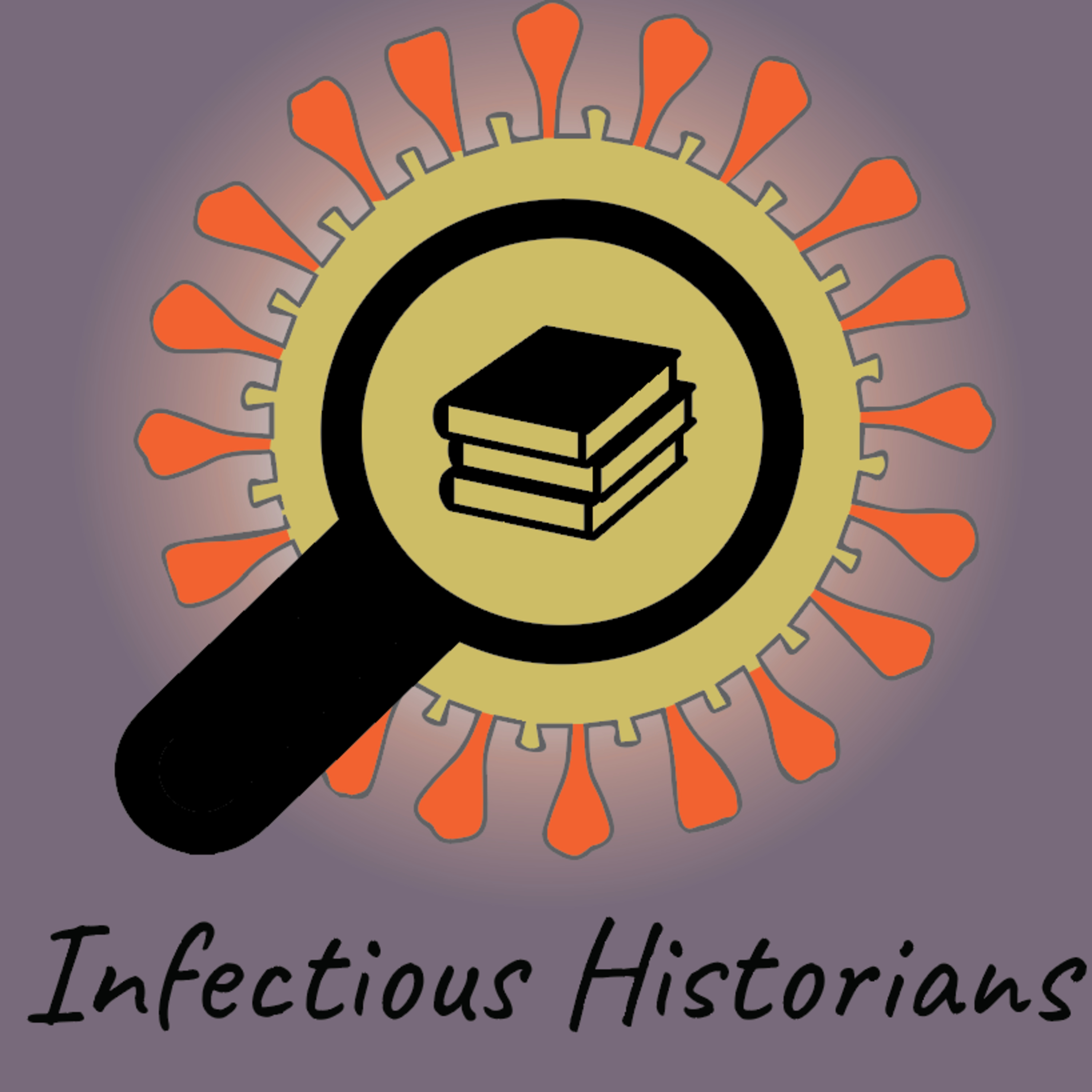
Infectious HistoriansEpisode 0 - IntroductionAs the coronavirus (COVID-19) pandemic continues to spread, in this short episode hosts Merle Eisenberg and Lee Mordechai discuss the reasons for launching a new podcast now, begin to consider how historical diseases might help us think about our present, and outline some of the upcoming podcast episodes.
2020-03-2710 min